
The cover image was created by the transcriber and is placed in the public domain.
Title: The Wallypug of Why
Author: G. E. Farrow
Illustrator: Dorothy Furniss
Harry Furniss
Release date: January 13, 2020 [eBook #61163]
Most recently updated: October 17, 2024
Language: English
Credits: Produced by David Edwards, Barry Abrahamsen, and the Online
Distributed Proofreading Team at http://www.pgdp.net

The cover image was created by the transcriber and is placed in the public domain.

A KIND OF PROCESSION FILED INTO THE HALL.
Frontispiece. See page 56
| CHAP. | PAGE | |
| I. | THE WAY TO WHY | 7 |
| II. | THE FISH WITH A COLD | 24 |
| III. | BREAKFAST FOR TEA | 38 |
| IV. | GIRLIE SEES THE WALLYPUG | 52 |
| V. | WHAT IS A GOO? | 64 |
| VI. | THE WALLYPUG’S FANCY DINNER PARTY | 77 |
| VII. | THE INVISIBLE JOKE | 93 |
| VIII. | CAN A PIG PERCH? | 107 |
| IX. | BUYING AN EXCUSE | 124 |
| X. | THE RIDE WITH THE ALPHABET | 135 |
| XI. | GIRLIE IS CARTWRECKED | 147 |
| XII. | THE SPHINX AND THE BATHING-MACHINE WOMAN | 159 |
| XIII. | WHAT HAPPENED AT WHY | 174 |
6
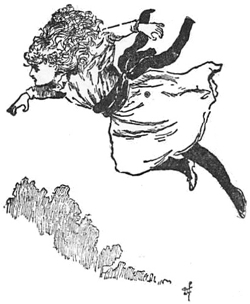
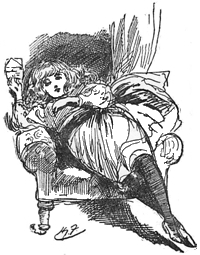
IT was a very warm afternoon, and Girlie was sitting by the play-room window watching the gold fish idly swimming about in her little aquarium. She was feeling very “sigh” as she called it, that is, not very happy, for her brothers were all away from home, and she had no one to talk to. Even Boy, her youngest brother, was staying with some friends at Broadstairs, and she thought it very hard that she should have to wait at home for another week before joining him there. Her aunt, 8with whom she was staying, had received a letter from him that morning and had brought it up to Girlie to read.
“But it will only make me more sorry than ever that I am not there,” thought poor Girlie. She had the letter in her hand and was trying to decide whether she should read it or not when she caught sight of a few words at the bottom of the first page, which was half drawn out of the envelope:—

was written in Boy’s big, sprawling handwriting.
“Whatever is a Goo?” thought Girlie; and, instead of reading the rest of the letter as most people would have done, she shut her eyes and tried to think whether she had ever heard of, or seen such a thing. She was trying hard to remember whether there was such a creature mentioned in her Natural History book, and had just come to the conclusion that she had never read of one, when she heard a little cough from the other end of the room, and, opening her eyes, she saw Dumpsey Deazil, her favourite doll, struggling up from the very uncomfortable position in which she had been lying, with her head in a domino box and her feet on Noah’s Ark.
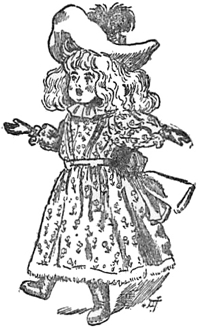
DUMPSEY DEAZIL.
Girlie stared with amazement, and the more so when Dumpsey Deazil, having succeeded in getting on to her feet, walked awkwardly up to where she was sitting, and holding out a stiff, sawdust-stuffed hand, said in a squeaky little voice:
“So you want to know what a Goo is, do you?”
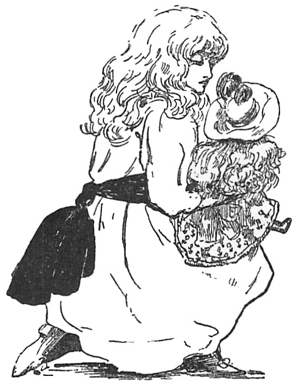
“‘YOU DEAR OLD THING,’ CRIED GIRLIE.”
“Oh, you dear old thing!” cried Girlie, jumping up excitedly, and catching Dumpsey Deazil up in her arms. “I always knew that you could talk if you only would, and now at last you are going to do so, just as dolls always do in fairy tale books.”
10“Of course all dolls can talk if they like,” said Dumpsey Deazil; “only they never do so, except when they wish. But about the Goo, do you really want to know what it is?”
“Yes, I do,” said Girlie, “because I don’t remember ever having heard of such a thing.”
“Well, I don’t quite know what it is myself,” said Dumpsey Deazil, “but I can take you to the land of Why if you like, where all the questions and answers come 11from, and then you can find out for yourself, you know.”
“Oh! that would be splendid!” exclaimed Girlie. “Is it a very long way off though?”
“Yes, it is rather a long way,” admitted Dumpsey Deazil; “but it would not take us long to get there by the way in which we should go.”
“How is that?” asked Girlie. “By train?”
“Oh dear, no!” cried Dumpsey Deazil; “by a much quicker way than that. You have just to take hold of one of my hands and, shutting your eyes very tightly, count up to one hundred aloud, and then when you open them again you will find yourself there.”
“What a funny way to travel,” said Girlie. “I am sure, though, that I should like it very much indeed. Can we go now, this very minute?”
“Yes,” said Dumpsey Deazil; “but, before we start, you must promise me that you will be very kind to the Wallypug, for he is a kind of relation of mine.”
“The Wallypug! Good gracious! Whoever is he?” exclaimed Girlie.
“You will see when you get to Why,” said Dumpsey Deazil mysteriously. “Now then, are you ready? Remember, though, you must be sure and not let go of my 12hand till you have counted up to one hundred, or you will lose me.”
“All right!” promised Girlie, taking hold of Dumpsey Deazil’s hand and screwing up her eyes very tightly. “One, two——”
She was sorely tempted to open her eyes, however, when she felt herself being carried off her feet; still, she felt very comfortable and it seemed to her that she was floating rapidly through the air.
“Eighty-five, eighty-six! Oh dear! somebody has taken hold of my other hand now,” cried Girlie. “I really must look.”
And, opening her eyes, she found herself in a country lane.
A benevolent-looking little old gentleman, dressed in knee breeches and wearing a huge broad-brimmed hat, was holding her wrist with one hand, while in the other he held a toy watch.
Dumpsey Deazil was floating rapidly away in the distance, frantically waving her arms and screaming out in an agonised voice,—
“I told you not to open your eyes until you had got to one hundred!”
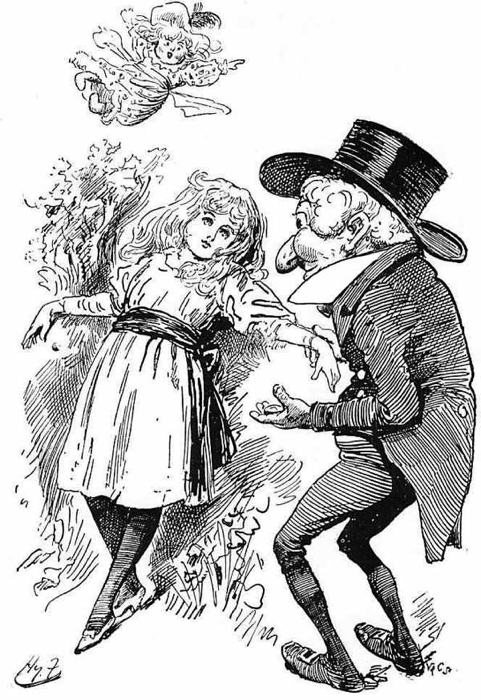
“DUMPSEY DEAZIL WAS FLOATING RAPIDLY AWAY.”
14Girlie watched her disappear over the hedge, and then turned in dismay to the little old gentleman, who was still holding her hand and beaming upon her with a reassuring smile.
“Your friend was taking you through the air rather too quickly to be good for your health, so I thought that I had better stop you,” he said.
“Well, then, I think it was very rude of you,” said Girlie, who felt greatly alarmed at having lost Dumpsey Deazil. “I don’t know, I am sure, however I am going to get home again now,” she continued, feeling half inclined to cry.
“Excuse me, you should never say ‘I don’t know,’” said the old gentleman. “It is a very bad plan. If you really do not know anything, you should always pretend that you do. I invariably do so, and I ought to know, for I am the Wallypug’s Doctor-in-law.”
“Oh! Who is the Wallypug, please?” asked Girlie curiously, “and I’m afraid I don’t know what a doctor-in-law is, either.”
“One question at a time, my child,” said the old gentleman. “Who the Wallypug is you will soon find out for yourself; and a doctor-in-law is something between a father-in-law and a step-father, a sort of half-a-stepfather, 15in fact. That will be six-and-eightpence, please,” and the Doctor-in-law held out his hand with a smile.
“What for?” exclaimed Girlie.
“Professional advice,” said the Doctor-in-law blandly.
“What advice?” asked Girlie; “I don’t know what you mean.”
“Didn’t I advise you never to say, ‘I don’t know’?” explained the Doctor-in-law.
“But I didn’t ask you to give me any advice at all,” cried Girlie in dismay.
“Oh! if I waited till people asked me for advice I should never get any clients!” said the Doctor-in-law; “and you might as well give me the other guinea at the same time,” he continued.
“What other guinea? What do you mean?” asked Girlie.
“The guinea for professional attendance when you first arrived here,” said the Doctor-in-law. “I always charge a guinea for that.”
“But I didn’t want you to attend to me,” said Girlie indignantly. “I wish you hadn’t.”
“If I waited till people wanted me to attend to them I should get no patients,” admitted the Doctor-in-law; “so I always attend to people when I think they require it, 16whether they wish me to do so, or not. I must really insist on the fee, please. Let’s see, that will be three pounds seven altogether, won’t it?” he continued, making a calculation in his pocket-book.
“Certainly not!” said Girlie; “how can you make that out?”
“Well, you see, if you add them together they come to about that,” said the Doctor-in-law.
“I am sure they don’t,” cried Girlie.
“It’s very rude to contradict your elders,” remarked the Doctor-in-law severely. “I am surprised at you. Give me the money at once, please.”
“But I have no money with me,” said Girlie, getting rather frightened.
“Dear me, this is very serious,” said the old gentleman, looking genuinely grieved. “Do you really mean to tell me,” he continued, “that you are travelling about the country without any money at all in your pocket?”
“Yes,” said Girlie. “You see, I didn’t know that I was coming here, or that I should require any.”
“Oh! that’s an absurd excuse, my dear,” said the Doctor-in-law. “But what’s that in your hand?” he continued, staring at her right hand.
Girlie opened it, and found a crumpled piece of paper 17in it, though how it came there she could never tell. Smoothing it out, she found it to be a kind of money-order with the words, “Please to pay the bearer the sum of five pounds. Signed, The Wallypug,” written on it.
“Oh! a Wallypug order for five pounds; that will do very nicely,” said the Doctor-in-law, taking it from her and putting it into his pocket. “And now you will only owe me the odd sixpence,” he said.
“What odd sixpence?” asked Girlie. “I don’t remember anything about a sixpence.”
“Well,” said the Doctor-in-law, “if you don’t remember it, it’s very odd, therefore it must be an odd sixpence; don’t you see, my dear?” and he held out his hand again.
“But I’ve already given you five pounds instead of three pounds seven,” said Girlie, getting hopelessly muddled.
“Well, my dear, don’t let that worry you in the least,” said the Doctor-in-law kindly; “I’ll overlook it this time, and, if you can’t find the sixpence, I don’t mind taking your watch instead. I see that you have a very pretty one.”
“I think it’s very unkind and greedy of you, then!” said Girlie, turning very red and feeling greatly frightened; for her watch had been given to her by her aunt, and she was allowed to wear it only now and then as a great treat.
“Not at all, my dear; you don’t look at these things in 18the right light,” said the Doctor-in-law. “Don’t you see that, if you can’t pay me the money, it is only fair that you should give me your watch?”
“But it is worth a great deal more than sixpence,” argued Girlie.
“Not at all!” said the Doctor-in-law, flourishing his watch about at the end of the chain. “Mine only cost a penny.”
“Yes, but yours doesn’t go,” objected Girlie; “mine does, you know.”
“Does what?” asked the Doctor-in-law.
“Go!” said Girlie.
“Oh, well, then, I don’t want it,” said the Doctor-in-law hurriedly. “I don’t want a watch that will go, I want one that will stay. Why, if my watch was to go, I should always have to be going after it! and, talking about going, I must be off or I shall be late for the Wallypug. You can pay me the half-crown when we meet again.” And, with a nod and a smile, the little old gentleman pocketed his watch and hurried off.
“Oh! if you please!” cried Girlie, running after him, “could you direct me to——”
“Can’t stop!” interrupted the Doctor-in-law; “my time is far too valuable, and besides, you have no money.” 19And walking rapidly away, he got over a stile and disappeared into a field beyond.
“Oh dear me! whatever shall I do now?” thought poor Girlie, looking about her in dismay.
There was nobody in sight, so she decided to sit down on the bank and wait until some one came past who would direct her to somewhere or other.
“For I haven’t the remotest idea where I am,” she thought. “I don’t even know how many miles I am from home. I wonder,” she went on, “how many miles one can travel through the air while you count eighty-five. I suppose it depends upon how quickly you are travelling. Perhaps I could make a sum of it and do it by rule of three. Let’s see! If it takes one girl one minute to count sixty, how many miles can a girl and a doll travel through the air while you count eighty-five? I suppose you have to multiply the minutes by the miles, and divide by the number of people,” she thought; and was so very busy trying to do this sum in her head, as she described it, that she did not notice a young man walking down the lane, till he had nearly reached her.
Girlie could scarcely keep from laughing when she first saw him, for he looked such a very comical person; he had long hair, and wore glasses, and carried his hands 20dangling in front of him. (“For all the world like a kangaroo,” thought Girlie.)
He came and sat down quite close to her, and after staring at her for some time, smiled in a patronising kind of way.
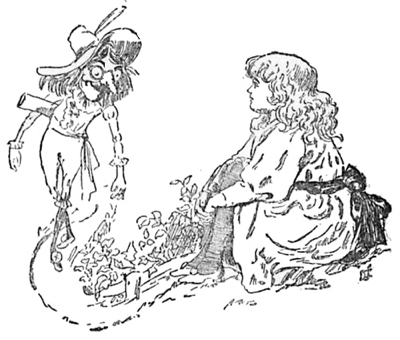
“HE LOOKED SUCH A VERY COMICAL PERSON.”
“Don’t you think me very handsome?” he said at last.
“Well, I am afraid not,” stammered Girlie, who did not like to hurt his feelings by telling him what she really did think about him.
“Dear me! then your eyes must be seen to, decidedly,” 21said the young man. “Why, you must be nearly blind not to see that I am very, very beautiful; and I am a very important person, too,” he continued impressively.
“Are you really?” asked Girlie, who could scarcely keep serious.
“Yes, I am a very superior individual indeed. I am the King’s Minstrel, enormously rich, and I am going to marry the Wallypug’s niece. I compose better than any one else in the world.”
“Really!” said Girlie. “What do you compose?”
“Draughts,” said the King’s Minstrel. “Of course you have heard of composing draughts.”
“Yes,” said Girlie. “They are things to send you to sleep, aren’t they?”
“Sometimes,” said the King’s Minstrel. “Mine keep you awake, though, and that’s why they are so much better than anybody else’s.”
“Isn’t it very difficult to compose?” asked Girlie.
“Yes; it requires a great brain like mine to do it properly,” replied the King’s Minstrel conceitedly. “Would you like to hear my latest composition?” he asked.
“Yes, please,” said Girlie, folding her hands in her lap and preparing to listen.
22The King’s Minstrel took a roll of music from under his arm and, after coughing importantly, began to sing in a very harsh and discordant voice—
“There! isn’t it lovely?” he asked when he had finished.
“Why, it’s perfect nonsense!” cried Girlie; “it’s just a lot of separate lines from nursery rhymes all strung together; and, besides, there’s no sense in it,” she added.
“That shows you don’t know anything at all about it,” said the King’s Minstrel contemptuously. “Any respectable person knows that there never should be any sense in really good poetry; the less you are able to understand it the better it is; and it wouldn’t be a composition,” he went on, “if it wasn’t composed of several bits of other poems. The great thing is to get it to rhyme. You see this all rhymes beautifully.”
23“I’m sure the last two lines don’t!” said Girlie decidedly.
“Oh!” said the King’s Minstrel, looking rather confused, “you see, you have to pronounce ‘harm’ as near like ‘wall’ as you can; you often have to do that in poetry, you know. Besides, people always pardon little slips of that kind in really clever people, like myself. Good-bye! You may have the honour of meeting me again later,” he continued, preparing to go.
“Oh, I was going to ask you,” cried Girlie hurriedly, “whether you could kindly direct me to Why, or tell me the way to get home again.”
“I beg your pardon, but I make it a point never to do anything useful. I am purely ornamental,” said the King’s Minstrel, bowing politely and then strutting away with a conceited air, leaving Girlie once more alone in the lane.
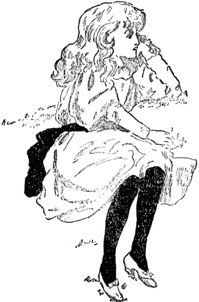
“WELL, which way shall I go?” said Girlie to herself looking up and down the lane, “for it will never do to stay here all day, you know. I wish I had a compass,” she continued, “I should know which way to go, then.”
Girlie had the haziest notions as to what a compass really is, but had come to the conclusion that you had only to look at one in order to find your way anywhere.
“I suppose,” she continued, “I had better follow the lane; it’s sure to lead to somewhere or other.”
25She could see that a little further on the roadway took a sudden turn to the left, and, on reaching the corner, she found herself facing a large pond, by the side of which a fish, well wrapped up in a plaid shawl, was sitting on a wooden stool fishing.
On the other side of the road was a five-barred gate, on which sat a calf dressed in a bright blue coat, yellow-striped waistcoat, and red plush knee-breeches; he wore his hat quite at the back of his head, because of his horns, and had a scarlet geranium in his coat; he was tapping his hoof impatiently with a small cane which he carried in one hand.
“Here she comes at last,” he called out to the Fish when Girlie came in sight.
“O-o-o-b! o-o-o-b! o-o-o-b!” said the Fish, rolling his great eyes around and staring dejectedly at her, and then immediately resuming his occupation.
“What does he say?” asked Girlie, who, somehow or other, did not feel at all surprised at this strange sight; perhaps it was because she had read so many fairy tales.
“Nothing,” said the Calf, “he never talks when he is fishing; it isn’t considered polite; he says ‘o-o-o-b’ because he can’t help it; all fishes say that, you know.”
And, when Girlie came to think of it, she remembered 26that her gold fish at home always seemed to be saying “o-o-o-b, o-o-o-b,” when she looked at them swimming about.
“But what is he fishing for?” she asked. “I have never heard of a fish fishing before.”
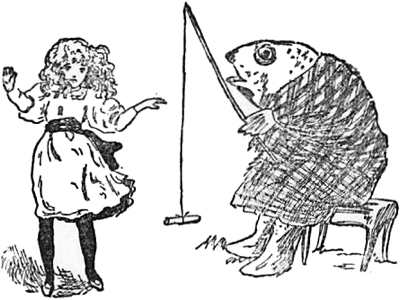
“‘WHAT IS HE FISHING FOR?’ SHE ASKED.”
“Why shouldn’t a fish fish, as well as a baker bake, or a tailor tail?” asked the Calf.
“But I’ve never heard of tailors tailing before,” said Girlie. “Do they?”
“Certainly they do,” said the Calf; “they retail and coat tail, don’t they?”
“Oh yes, of course,” admitted Girlie; “but what does he fish for?” she persisted, pointing to the fish.
“Compliments,” said the Calf abruptly.
27“Oh, I’ve heard of people fishing for compliments before,” thought Girlie. “Has he caught anything?” she asked.
“Yes,” said the Calf, grinning.
“What?” asked Girlie eagerly.
“Same as most folks do that go fishing—a cold,” replied the Calf.
“Oh dear! where did he catch it?” asked Girlie.
“In his head, to be sure,” said the Calf; “he is very subject to them; I think it’s being in the water so much,” he continued; “he gets frightfully damp sometimes when he’s been swimming about all day. It’s a great pity, too, for he is going to lecture at Why this afternoon before the Wallypug on the ‘Whichness of the What, as compared to the Thatness of the Thus.’ Shall you be there?” he asked.
“I don’t know,” said Girlie dubiously; “I want to go to Why, though,” she said. “Can you direct me?”
“Oh yes!” replied the Calf. “Do you know anybody there?”
Girlie, thinking that Dumpsey Deazil must have gone there, nodded her head.
“Oh, don’t do that,” cried the Calf in a tone of alarm, while the Fish turned slowly round and stared at her again.
28“What did I do?” asked Girlie.
“You nodded your head; it’s a very dangerous thing to do; you might turn into a Mandarin,” said the Calf.
“What is that?” asked Girlie, who couldn’t remember having heard the name before, though it seemed familiar too.
“Any one who cannot say ‘no’ is a Mandarin,” said the Calf; “the worst kind are the Chinese, who are born with a wire through their necks, so that they can only move their heads in one direction.”
“Oh, I know! You mean little figures that nod their heads when you touch them,” cried Girlie. “I remember now, I saw one in a toyshop the other day. They are made of china, aren’t they?”
“Of course,” said the Calf, “all the Chinese are made of china, just as all the Japanese are japanned. There is a song about a Mandarin that ought to be a warning to people not to nod their heads. Shall I repeat it?” he asked.
“Oh yes, please,” replied Girlie.
“O-o-o-b, o-o-o-b, o-o-o-b, stop a biddit,” said the Fish, putting away his fishing-rod and wobbling awkwardly towards them. “Led be hear id, too.”
29“Oh, you’ve heard it before,” said the Calf; “get on with your fishing.”
“O-o-o-b, o-o-o-b, o-o-o-b, I’ve odely heard id dide tibes,” said the Fish pleadingly.
“Very well, then, come and sit down,” said the Calf, pointing to where Girlie had settled herself on a little mound beside the road.
The Fish sat down, and, opening his mouth very widely, stared vacantly at the Calf, who repeated the following lines:—
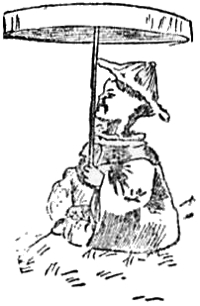
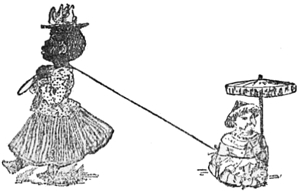
Girlie was just wondering whether she ought to clap her hands, when the Fish, who had been sitting all the while with his mouth wide open, rolled his eyes ecstatically and exclaimed in a gratified way—“O-o-o-b, o-o-o-b, o-o-o-b, thad’s very, very comfordig.”
“What do you mean?” asked Girlie.
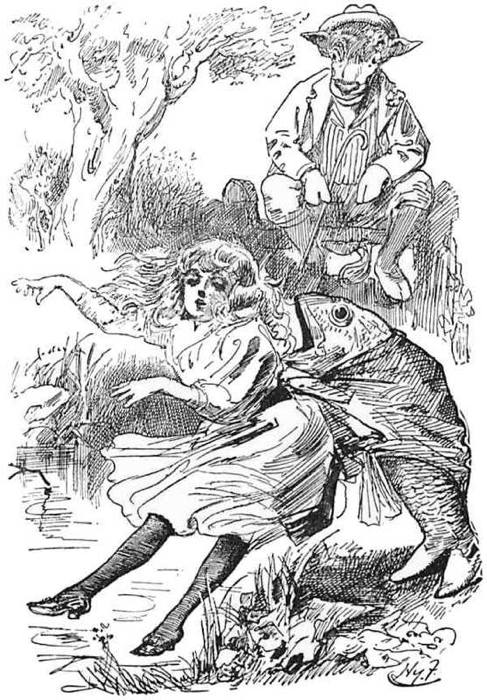
“SHE FELT HERSELF PUSHED ‘SPLASH’ INTO THE POND.”
“O-o-o-b. Well, you see, I couldn’t dod by head if 33I tried,” said the Fish, “so I cad dever get into the sabe buddle thad the baderid did. Besides——”
“I say,” interrupted the Calf, and speaking to Girlie, “hadn’t you better be off if you are going? or you won’t get to Why to-day, you know.”
Girlie had been so interested in hearing about the Mandarin, that she had forgotten all about wanting to go there.
“Shall you go by water?” continued the Calf.
“Is that the quickest way?” asked Girlie.
“Yes, it is,” said the Calf.
“Then I think I will,” said Girlie.
“Very well,” replied the Calf, “step in.”
“In where?” asked Girlie, puzzled to know what he meant.
“Into the water, of course,” said the Calf. “You said you were going by water, didn’t you?”
“But I shall get wet,” cried Girlie in alarm.
“Oh no, you won’t; this is dry water,” said the Calf.
“How absurd!” said Girlie; “why, I’ve never heard of such a thing.”
“Well, you haven’t heard of much, then,” said the Calf. “I suppose you haven’t even heard of dry champagne?”
34“Oh yes, I have,” said Girlie, “and often wondered what it meant.”
“Very well, then, this is dry water; it’s the same sort of thing,” said the Calf. “Step in, and you will see; you needn’t be afraid; make haste.”
After a little hesitation, Girlie walked to the edge of the water, and, before she could realise what had happened, she felt herself pushed “splash” into the pond by the Fish, who had followed closely behind her. Strangely enough, she did not feel frightened, but only very indignant, when she found herself sinking rapidly through the water.
“Dear me! I wonder how long I shall be reaching the bottom,” she thought: “it seems to be getting very dark, so I suppose that I must be a good way down by this time.”
She hadn’t time to speculate much longer, however, for she suddenly found herself stopping before a barrier at an underground station. A ticket porter was holding out his hand.
“Tickets, please,” he shouted in a loud voice.
“I’m very sorry, but I haven’t one,” said Girlie.
“Defrauding the Company, infringement of by-laws. Penalty, forty pounds!” said the Porter severely.
“Oh dear!” said Girlie, feeling really alarmed, “I didn’t 36know that I had to take a ticket.” And, when she came to think of it, she didn’t see how she could have done so.
“What class did you travel?” asked the Porter suddenly.
“I don’t know,” said Girlie, feeling dreadfully puzzled; “I don’t think that it was any class at all; besides, it was so dark that I couldn’t see.”
“Oh! that’s all very fine,” said the Porter, “but——”
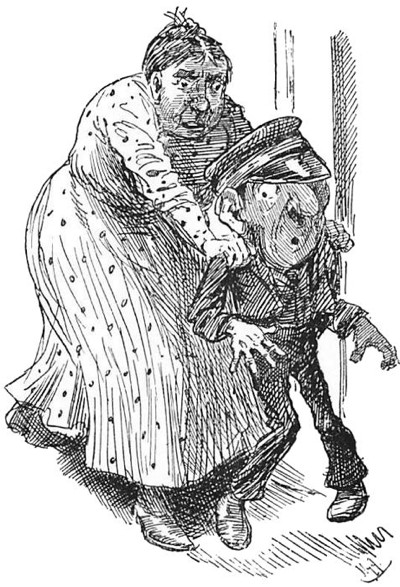
“‘GO IN DIRECTLY AND FINISH SCRUBBING THE FLOOR.’”
What he meant to say Girlie never knew, for, at that moment, a very stout, cross-looking woman, came through a door at the side of the barrier, and called out in a harsh voice to the Porter:
“Dawdling away your time again, are you? leaving me as usual to do all the work; go in directly and finish scrubbing the floor;” and, catching hold of the poor Porter’s coat collar, she pushed him roughly through the door, slamming it violently after him.
“Now, then, what do you want?” she exclaimed, turning round furiously to Girlie.
“Oh! if you please——” began Girlie nervously, feeling very much alarmed.
“Well, then, I don’t, please,” said the woman, snapping her up before she could finish the sentence; “and if you’re not off this very minute, you’ll catch it, I can tell you.”
Girlie did not wait to be told a second time, but, running 37as quickly as she could along the platform, she hastened up the stairs at the other end. “Oh dear! oh dear!” she panted while she hurried along, “I do hope that all the people here are not so cross and disagreeable as that; although I don’t know, I’m sure,” she thought, “what I should have done about that ticket, if she hadn’t come out and sent the Porter away;” and, finding to her great relief that she was not being followed, Girlie hurried up the stairs.
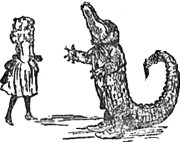
WHEN she reached the top of the stairs, Girlie found herself in a courtyard, surrounded by high railings and some massive iron gates. There was a lodge by the gates, at the door of which stood an old crocodile with a white bandage around his head. He came slowly towards Girlie, carrying some enormous keys in his hand.
“Have you had your tea?” he queried anxiously.
“No!” said Girlie, thinking that she should very much like some after all those stairs.
“Very well, then,” said the Crocodile, “we will have some together; step this way.” Girlie followed him into the lodge, the door of which opened directly into a cosy little room. A table stood in the centre, covered with a white table-cloth.
39“Will you have some eggs with your tea?” asked the Crocodile kindly.
“Yes, please,” replied Girlie.
“And some cake and jam?” continued the Crocodile, smilingly.
“I should like some very much indeed, thank you,” said Girlie, who thought him very kind.
“Wait a minute,” said the Crocodile; “I had better put it down so that I don’t forget;” and he took down a slate that was hanging behind the door.
“Let’s see,” he continued, writing it down, as he went on, “thin bread-and-butter, eggs (boiled, I suppose?),” he enquired, looking at her.
Girlie was just going to nod her head, when she suddenly remembered that, if she did so, she might turn into a Mandarin; so she hastily said “Yes, please,” instead.
“Tea, cake, and jam,” continued the Crocodile, putting it all down on his slate.
“Are you sure you won’t have anything else?” he asked.
“Oh no, thank you,” said Girlie, “that will do very nicely.”
“All right,” said the Crocodile; “where are the things?”
“What things?” asked Girlie in a surprised voice.
40“Why, the things for tea, of course,” said the Crocodile.
“But I haven’t any,” said Girlie; “I thought that you asked me to take tea with you,” she continued.
The old Crocodile burst into tears.
“I think it most cru-cru-cruel of you,” he sobbed, “to raise my ho-ho-ho-hopes in this way only to dis-dis-dis-ap-ap-ap-point me. You said you were going to have eggs,” he cried tearfully, referring to the slate, “and ca-ca-cake, and ja-ja-jam;” and the poor old thing was quite overcome with grief.
“Oh, please don’t cry,” said Girlie, who felt quite sorry for him; “I am disappointed, too, you know.”
The Crocodile dried his eye (the other one was covered with the bandage) and began to brighten up a little.
“I know what we’ll do,” he said at length. “Do you ever have tea for breakfast?”
“Yes,” said Girlie, “I don’t care for coffee.”
“Very well, then, let’s have breakfast for tea instead,” suggested the Crocodile.
“But how can we do that if we haven’t the things?” asked Girlie.
“Oh! I have enough for breakfast,” said the Crocodile, going to the cupboard and bringing out a basket of eggs, a loaf of bread, some butter, a large iced cake and a pot of jam.
41“Why, they’re the same things that we were going to have for tea,” thought Girlie.
“Let’s see, one for you, one for me, and one for the pot,” remarked the Crocodile, putting three spoonfuls of tea into the teapot. “You will find some hot water in the next room,” he continued, handing it to Girlie.
Girlie took the teapot and went to the door; she found that it led into a large kitchen paved with red bricks. The room was filled with steam and, at the further end of it, Girlie could just see three large washtubs at which three seals were washing table-cloths. They had coloured handkerchiefs tied over their heads, and were singing when Girlie entered. She could not hear all the words, but just caught the end of the verse:—
It finished on a very high note, which none of the seals could reach, so that it ended in a kind of squeal.
“What do you want?” asked the largest Seal, catching sight of Girlie; “some hot water?”
“Yes, please,” said Girlie.
“Are you going to have tea or breakfast?” asked the Seal anxiously.
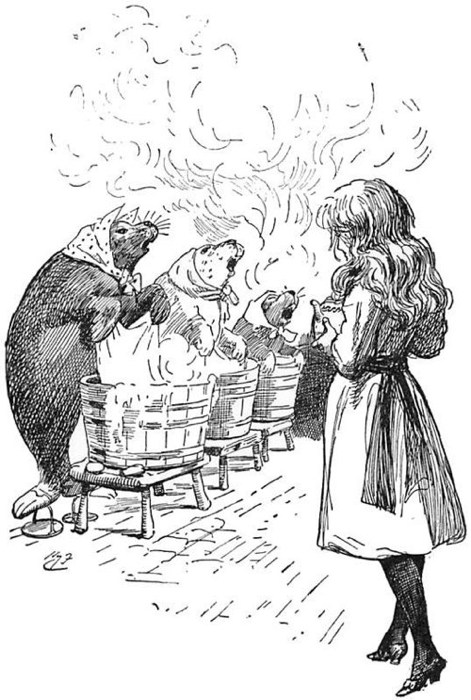
“THEY WERE SINGING WHEN GIRLIE ENTERED.”
43“Breakfast, I believe,” said Girlie, though she couldn’t at all see why it should be called breakfast any more than tea.
“Ah! I was afraid so,” said the Seal in a disappointed voice, while the other seals sighed heavily. “We haven’t had tea here for weeks and weeks. How many spoonfuls did he put in, dear?” he continued, taking the teapot from her.
“Three,” said Girlie.
“One each,” said the Seal to the others, who nodded their heads, then turning out the tea into a cup, he filled the teapot with boiling water from a kettle on the fire, and handed it back to Girlie.
“Aren’t you going to put the tea back again?” she asked.
“Certainly not,” said the Seal; “that’s for us.”
“How do you know?” said Girlie.
“Because there were three spoonfuls and there are only two of you, so it must be for us; now hurry back to the Crocodile, or he will think you are lost,” said the Seal.
Girlie took the teapot doubtfully, and went back to the other room. She found that the Crocodile had set the table while she had been gone.
“Will you pour out, please?” he said, seating himself, and motioning Girlie to the head of the table. “Did you 44hear how he is to-day?” he continued in an anxious tone when she had taken her place.
“Who?” asked Girlie.
“The tea,” said the Crocodile; “he has been very poorly lately. Ah!” he continued, while Girlie poured out the hot water, “poor little thing! poor little thing! How dreadfully pale and weak he is, to be sure!” and, taking the teacup from her, he gazed down into it anxiously. “Do you think a little milk would do him any good?” he asked at last.
“I don’t think it could possibly do any harm,” said Girlie, who felt very much inclined to laugh.
“Pass the milk-jug, then,” said the Crocodile.
Girlie did so, and the Crocodile poured a little milk into his cup.
“Gracious!” he cried, in an alarmed voice, after he had done so. “It’s worse than ever; he is turning paler than he was before. Pray run into the next room and ask how the seals’ tea is getting on.”
Girlie got up again and went into the kitchen.
The Seals had left their washtubs, and were sitting around the fire on little three-legged stools, eating rather thick bread-and-butter; and the eldest Seal was just pouring out tea.
45“The Crocodile wishes to know how your tea is, if you please,” said Girlie.
“Oh! give him our compliments,” replied the Seal, “and say that he is very well, thanks; getting quite strong, and is learning to draw very nicely. How is his poor tea, do you know, dear?” he added.
“Very weak,” said Girlie (“and likely to be so,” she thought).
“Do you mean to say you haven’t brought us any cake?” said the youngest Seal.
“No,” said Girlie. “I didn’t know you wanted any.”
“Well, go and fetch some then, and bring your teacup back with you,” said the Seal. “You shall have some of our tea, if you like; it will be better for you.”
Girlie thought so, too, and ran back to the other room to ask for some cake for the seals.
She found the Crocodile with his hat and gloves on. At the door stood a perambulator, in which was the weak cup of tea, propped up with pillows, and carefully wrapped in a little woollen shawl.
“I can’t enjoy my breakfast till I have taken the poor little thing out for a breath of fresh air,” said the Crocodile when she came in. “Did you hear how their tea is?” he asked anxiously.
46“Oh, quite strong and beginning to draw very nicely,” said Girlie.
“I’m sure I’m very glad to hear it,” said the Crocodile, wiping his eye and looking ruefully at his own weak tea. “I shall probably not be back for some time,” he continued, “so, perhaps, I had better say good-bye. Pray make yourself at home.” And, after shaking hands with her, the poor old creature went out, looking very mournful, and tenderly wheeling the perambulator with the weak cup of tea in it.
“How absurd!” said Girlie to herself; and, after watching him out of sight, she took her cup and saucer with her, and went back to the seals.
“I say,” said the eldest Seal when she entered the door, “there’s a letter for you in the post.”
“How do you know?” asked Girlie, putting down the cake, and passing her cup over for some tea.
“Because I put it there,” said the Seal.
“Put it where?” asked Girlie.
“In the post,” said the Seal in a tone of surprise.
“What do you mean?” asked Girlie.
“Go and see for yourself,” said the Seal, pointing to the door at the other end of the kitchen.
Girlie walked across and saw that the door-post had 48a number of little slits in it, in one of which was a letter.
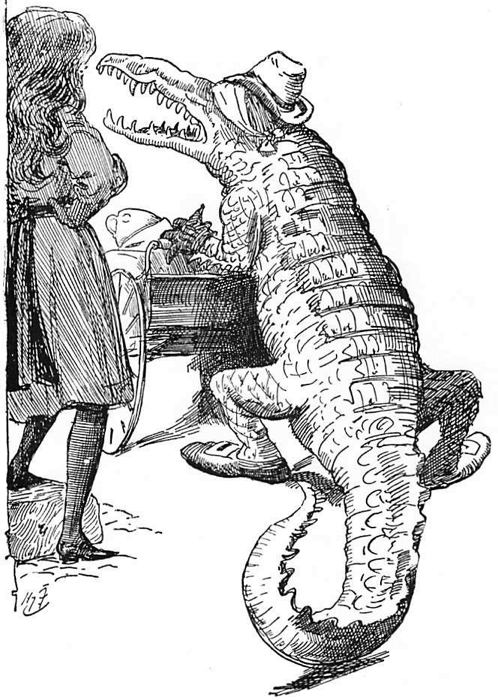
“TENDERLY WHEELING THE PERAMBULATOR WITH THE WEAK CUP OF TEA IN IT.”
Drawing it out, she found it addressed to herself:
“Miss Girlie,
“c/o The Crocodile,
“The Lodge,
“Why.”
Very curious to know what it was about, she hastily opened the envelope, and was greatly disappointed to find a plain sheet of paper with only the letter “C” written on it.
“Wasn’t it kind of me to send it?” asked the Seal when she walked slowly back.
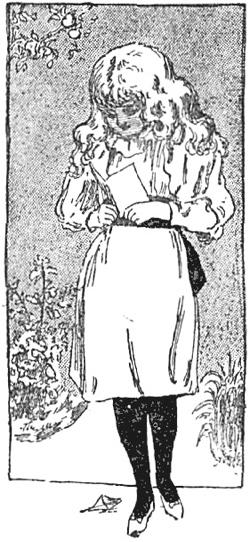
“‘BUT THERE’S NOTHING IN IT,’ SAID GIRLIE.”
“But there’s nothing in it,” said Girlie.
“Isn’t there a letter?” asked the Seal.
“No,” said Girlie; “nothing but a plain sheet of paper with a big ‘C’ on it.”
“Well,” said the Seal, “that’s a letter, isn’t it, stupid? I didn’t say that I had sent you a lot of letters, did I? I thought you would like the letter ‘C’; it’s such a useful one.”
“What is it good for?” asked Girlie, who didn’t see how it could be of much use to her.
49“Why, to suggest things, of course,” said the Seal. “You have only to look at it in order to think of all kinds of lovely things—cakes and carpets, calico and crockery, for instance, to say nothing of chocolate creams and crumpets.
“Of course there are some uncomfortable things, too, such as caterpillars, centipedes, and castor-oil; but, on the whole, it’s a most useful letter.”
“Yes; very different from some,” said the middle-sized Seal, who had not spoken to Girlie before.
50“I had the letter ‘M’ sent to me once,” he continued, “and immediately had the measles, the mumps, and the megrims, and did not get over them till somebody kindly sent me the letter ‘T,’ so that I could have travelling with tranquillity, and Turkish delight. I wish some one would send me ‘G,’” he went on, “so that I could have gooseberries and greengages and grapes. I’m so fond of fruit.”
“Then I should think ‘F’ would be the best letter to have, wouldn’t it?” asked Girlie. “‘F’ stands for fruit, you know.”
“Yes, and frogs and freckles and five-finger exercises, too,” said the Seal. “No, thank you—not for me. One has to be very careful, I can tell you.”
Just then a great bell began to ring, and the seals got up hastily and went back to their washtubs.
“What’s that?” asked Girlie.
“The public meeting is about to commence next door,” said the eldest Seal. “Wouldn’t you like to go?”
“What is it about?” asked Girlie.
“To settle questions,” replied the Seal. “All the questions and answers are decided at these meetings. The Wallypug will attend in state,” he continued.
51“Oh! I should like to see the Wallypug,” said Girlie eagerly. “And I have an important question to ask, too,” she thought, remembering the Goo. “May any one go?” she asked aloud.
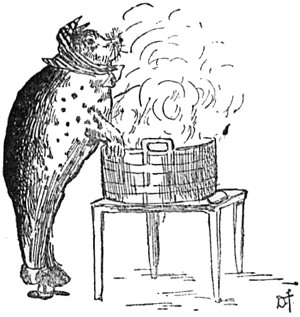
“THE SEALS ... WENT BACK TO THEIR WASHTUBS.”
“Yes,” said the Seal. “Only you must make haste or you will be too late. You can go through the garden, if you like,” he suggested, opening the door for her, and pointing to a green gate at the end of the path.
Girlie thanked him and, hastily bidding them all good-bye, ran down the pathway and opened the gate.
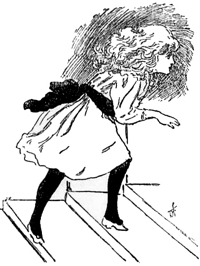
“LATE again!” called out the Hall Porter when Girlie hurried up the broad stone steps leading to a great building opposite to the little green gate.
“How can I be late again,” asked Girlie angrily, “when I’ve never been here at all before?”
“If you’ve not been here before, then you must have been behind,” said the Hall Porter; “and, if one is behind, they are late, don’t you know? You are fined sixpence,” he added, taking sixpence from his pocket and handing it to Girlie.
“What is this?” she asked.
53“The sixpence that I fined you, of course,” replied the Hall Porter.
“But what am I to do with it?” asked Girlie in surprise.
“Oh! findings’, keepings,” muttered the Hall Porter, walking away. “Put it in your pocket; you’ll want it soon.”
And, sure enough, before she had gone many steps along the stone corridor, Girlie came to a great door with the words “Admission, sixpence” written on it.
After knocking timidly, she waited awhile, till it was, at last, opened by a policeman, who, silently taking the sixpence which she offered him, motioned her to a seat near the door.
“Well, it’s a good thing that I was fined, or I should never have got in here,” thought Girlie; and she sat down and looked about her curiously.
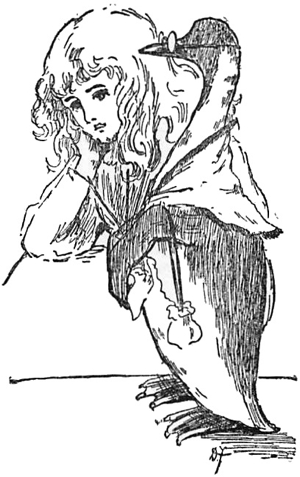
“‘DON’T TAKE ANY NOTICE OF THEM, DEAR.’”
She found herself in a long Gothic hall with low seats against the wall on each side. At one end was a raised dais, on which was a throne with a canopy over it. The centre of the room was quite bare. On the seats against the wall were sitting a number of animals, and Girlie could see that the Fish with a cold and his companion the Calf were sitting near the throne. The Fish had his tail in 54a tub of hot mustard-and-water; and by his side was a small table, on which were a basin of gruel, some cough mixture and a packet of lozenges. And near him, at a low desk, sat a Lobster writing rapidly; Girlie afterwards discovered that he was a Reporter. None of the animals had taken the slightest notice of her on her entrance except an old white Cockatoo in a Paisley shawl, carrying a huge market-basket, and who, as soon as Girlie sat 55down, made some remark to two Monkeys who were sitting near her. The Monkeys laughed, and one of them, leaning forward so that he could see Girlie more distinctly, made a grimace at her.
“Don’t take any notice of them, dear,” said a motherly-looking Penguin, who sat next to her knitting a very curiously-shaped stocking. “They are always rude to strangers; and I think you have not been here before, have you?” she asked smilingly.
“No, never,” replied Girlie, smiling back again, for she quite took to this kindly-looking creature.
“You’re what they call a Proper Noun, aren’t you?” asked the Penguin after a pause.
Girlie thought the matter over, and then replied that she supposed she was, although usually spoken of as a little girl.
“It’s all the same, my dear,” said the Penguin. “All girls are nouns, you know, although all nouns are not girls, which is very funny when you come to think of it, because——”
Before she could finish the sentence, there was a stir amongst the animals, when a severe-looking gentleman in black velvet and steel buckles and buttons entered, carrying a long wand.
56“Silence!” he cried in a loud voice, and the talking, which had been going on all over the room, immediately ceased.
“The Husher,” whispered the Penguin, hastily putting away her knitting.
“Silence!” again called out the Husher, glaring fiercely at Girlie.
“I didn’t speak, sir,” said Girlie nervously.
“Yes, she did! yes, she did!” screamed the Cockatoo. “She’s been talking ever since she came in,” she went on noisily.
“Silence, both of you!” said the Husher, frowning severely first at Girlie and then at the Cockatoo, and then walking to the other end of the room, as a door at the top of some steps near the throne opened, and two Heralds entered, blowing a blast on their trumpets.
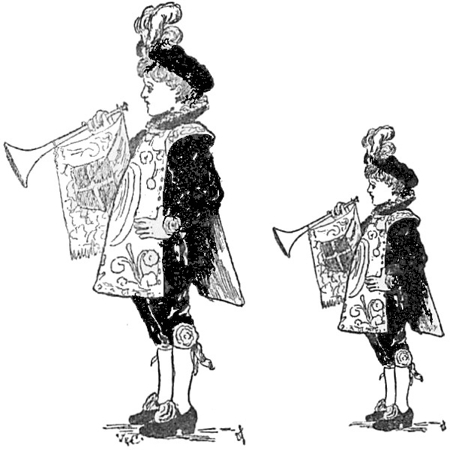
“TWO HERALDS ENTERED.”
“Here comes the Wallypug!” said the Penguin, and everybody stood up as a kind of procession filed into the room.
Girlie and the Penguin moved a little nearer the door, in order to see more distinctly.
First in the procession came the Doctor-in-law, smiling blandly; then the King’s Minstrel came strutting in, looking more conceited than ever, and carrying a large 57roll of music under his arm. He was followed by an elderly gentleman carrying a microscope.
“The Royal Microscopist,” said the Penguin in answer to an inquiring glance that Girlie gave her.
“What is the microscope for?” asked Girlie in a whisper.
“To see the jokes with,” replied the Penguin. “Some of them cannot be seen at all without it.”
Following the Royal Microscopist came an old lady in 59a poke bonnet and black lace shawl, who turned out to be the Head Mistress of the High School at Why. She was a very sharp-featured person and wore blue glasses.
There was a slight pause, and then the Wallypug entered. He was a meek-looking little creature, splendidly dressed in royal robes, which, however, fitted him very badly, and his crown was so much too big that it came quite over his head and just rested on the tip of his nose. He carried an orb in one hand and a sceptre in the other. His long velvet cloak, lined with ermine, was held by two pages, who were giggling and occasionally giving the cloak a tug which nearly upset the poor Wallypug, who seemed to have great difficulty in getting along as it was. (See Frontispiece.)
“Now then, Wallypug, sparkle up!” called out the Husher, giving him a poke with his wand as soon as he entered the door.
Girlie was greatly surprised to see him treated so disrespectfully, and was quite indignant when, the Wallypug having reached the steps of the dais, the pages gave an extra hard pull at his cloak and caused him to fall awkwardly forward on to his hands and knees, dropping his orb and sceptre and knocking his crown further over his face than ever.
60Everybody else, however, seemed to think it a great joke, and even the Wallypug smiled apologetically while he scrambled nervously up to the throne.
During the time that the animals were settling into their places, Girlie found out from the Penguin that the Wallypug was a kind of King, governed by the people instead of governing them. He was obliged to spend his money as they decided, and was not allowed to do anything without their permission. He had to address every one as “Your Majesty,” and had even to wear such clothes as the people directed. The state robes he now wore had belonged to the previous Wallypug, who had been a much larger man, and that was why they fitted him so badly.
So soon as the room was quiet, the Husher announced in a loud voice, “The Speech from the Throne”; and the Wallypug immediately stood up, nervously fumbling at a sheet of parchment which he held in his hand. His crown being quite over his eyes, he had to hold the parchment nearly up to his nose in order to see what was written on it. However, he soon began in a feeble voice,—
“May it please your Majesties——” when he was immediately interrupted by the Cockatoo, who screamed out,—
61“We don’t want to hear all that rubbish! Let’s get to business.”
“Yes, yes,” cried several voices; “business first.”
The Husher called out “Silence! silence!” in a dignified way. “I think you had better sit down, though,” he added, turning to the Wallypug.
“Very well, your Majesty,” said the Wallypug, looking greatly relieved and sitting down immediately.
The Husher then walked over to the Fish and seemed to be asking him some question, to which the Fish evidently replied in the affirmative, for the Husher looked very pleased and immediately announced,—
“Ladies and gentlemen——”
“What about us?” screamed the Cockatoo.
“And others,” continued the Husher, giving a glance in her direction. “You will be pleased to hear that the Lecture to-day will be given by A. Fish, Esq., and the subject is one which will no doubt interest you all. It is ‘The Whichness of the What as compared to the Thatness of the Thus.’”
A storm of applause followed this announcement, in the midst of which the Fish arose, assisted by his friend the Calf, who, so soon as he had helped him to stand, ran hurriedly out of the room, returning 62almost immediately with a large kettle of boiling water and some more mustard. These he poured hastily into the tub, stirring it round and round and gazing up anxiously into the Fish’s face.
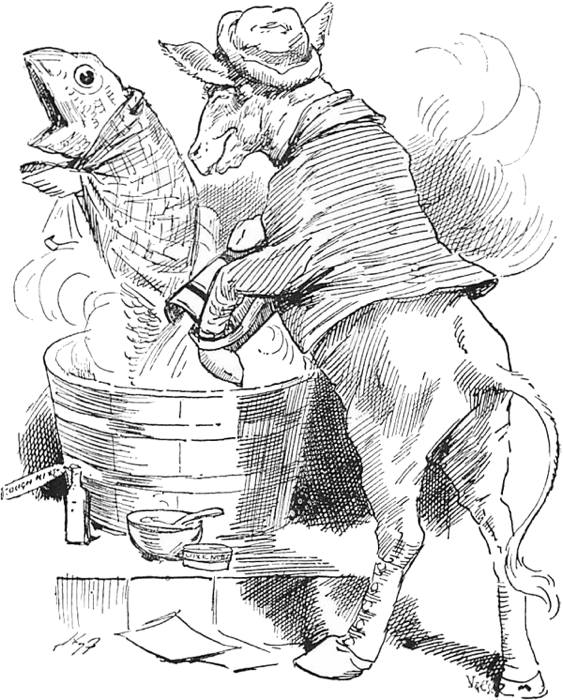
“THE FISH GASPED ONCE OR TWICE.”
The Fish gasped once or twice, and then, after swallowing a little gruel, he began in a very choky voice:
“O-o-o-b, o-o-o-b, o-o-o-b, Ladles ad Geddlebed——”
The Reporter looked up with a puzzled air. “May I trouble you to repeat that?” he asked, putting his claw to his head. “I didn’t quite catch the last part of the sentence.”
“O-o-o-b, o-o-o-b, I said, Ladles ad Geddlebed,” repeated the Fish, looking rather put out.
“Latin quotation?” asked the Reporter of the Doctor-in-law, who stood near him.
“Partly,” replied the Doctor-in-law. “‘Ladles’ is English, ‘ad’ is Latin, and ‘Geddlebed’ is Dutch, I think. It’s a very clever remark,” he continued.
The Reporter looked greatly impressed, and made a note of what the Doctor-in-law had said, and then waited for the Fish to go on.
The Fish, however, was taking some more gruel, and saying “O-o-o-b” between every spoonful. Presently he 63choked dreadfully, and, amidst great excitement, had to be helped from the room by the Calf and the Doctor-in-law, who kept thumping him violently on the back all the way to the door.
So soon as they had gone out, the King’s Minstrel jumped up and rapidly began undoing his roll of music.
“I will now oblige you with one of my charming songs,” he said.
There was immediately a great commotion in all parts of the room.
“No, you won’t!” “Turn him out!” “We don’t want to hear it,” was heard on all sides, while the old Cockatoo got positively frantic, jumping madly up and down, and screaming out as loudly as she could, “Down with him! Down with him! Down with him!”
The Husher rushed wildly about calling out “Silence! silence!” and it was not until the King’s Minstrel had sulkily rolled up his music and sat down again that order was restored.
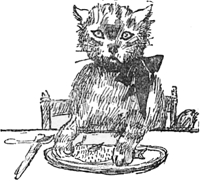
“LET’S have some Questions and Answers now,” suggested somebody, when they had all settled down into their places again.
“All right,” said the Husher. “Who has any questions to ask?” he continued.
Several animals held up their paws.
“Let’s have yours first,” he said, turning to a large black French poodle.
The Poodle at once got up and made a very polite bow. “It’s a ‘Question of Etiquette,’” he said, “and I’ve taken the liberty of putting it into verse.”
“No one should be allowed to write poetry but me,” said the King’s Minstrel sulkily.
65“Silence,” called out the Husher, frowning severely at him. “Go on with your question, Poodle.”
The Poodle bowed again, and placing his feet in the first position for dancing, read the following lines:—
“Family Coach,” called out the Husher when the Poodle had finished, and every one immediately rushed across the room and changed places with the one sitting opposite to him.
“What’s that for?” asked Girlie breathlessly, so soon as she reached the other side.
“So that we can hear both sides of the question,” replied the Penguin, waddling awkwardly to her seat.
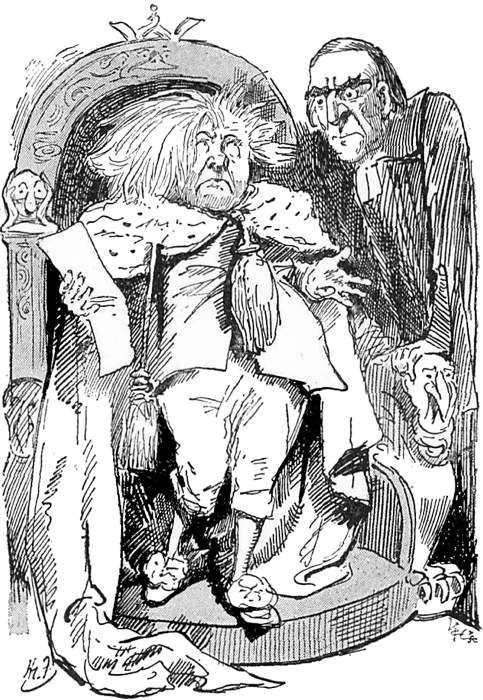
“‘IT CERTAINLY DOES LOOK RATHER SILLY,’ SAID THE HUSHER.”
68“Silence,” called the Husher. “Now repeat the question,” he added, turning to the Poodle.
The Poodle repeated the last verse.
“Now then, what’s the verdict?” asked the Husher, looking all around the room.
A small Guineapig at the further end held up his paw.
“Well?” said the Husher.
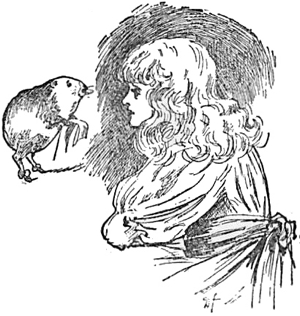
“‘I SHOULD LIKE TO PUT A FEW QUESTIONS.’”
“I should like to put a few questions to the Poodle before replying,” squeaked the Guineapig.
“Certainly,” said the Poodle politely.
“First of all,” said the Guineapig, referring to some notes that he had made, “you said you had heard that the people of Japan were most polite; now where did you hear it?”
“I read it in a book,” explained the Poodle.
“Then you didn’t hear it at all, so you are not telling the truth,” said the Guineapig severely.
“It’s the same thing,” argued the Poodle.
“It’s not!” said the Guineapig decidedly. “Now attend to me,” he continued; “has your cat left?”
“No,” said the Poodle, “she returned after she had eaten the fish.”
“Then,” said the Guineapig triumphantly, “if she’s 69not left she must be right, so you see you must call her ‘Right honourable’ in future.”
This answer seemed to give general satisfaction, and there was some attempt at applause, but the Husher called out severely, “Silence: next question,” and the Schoolmistress stood up.
“Mine’s French,” she said importantly. “Does any one here understand French?”
“I do, a little,” said Girlie, feeling quite proud of her knowledge.
Several animals on the same side of the room as herself leaned forward and stared at her curiously.
70“Bah! down with the foreigners!” screamed the Cockatoo.
“Silence,” called out the Husher, and every one listened attentively while the Schoolmistress asked the following question.
“Has the son of the miller the mustard of the daughter of the gardener?”
“That’s not French,” said Girlie contemptuously.
“I’m sure it is,” said the Schoolmistress; “isn’t it?” she asked, turning to the Husher.
“I’ve seen questions very much like it in my French lesson book,” he replied.
“Then, of course, it’s French,” said the Schoolmistress, while the Cockatoo screamed out, “Yah! who said she knew French and didn’t! laugh at her, laugh at her!” Before Girlie, who felt very indignant, could reply, the Husher had called out “Family Coach” again, and they all had to change places once more.
“Now does any one know the answer?” asked the Husher, after the Schoolmistress had repeated the question.
“Please, sir, I do,” said a meek-looking Donkey. “I work for the son of the miller, you know.”
“Well, has he the mustard of the gardener’s daughter?” asked the Husher.
71“Please, sir, yes,” said the Donkey.
“How do you know?” queried the Husher.
“Because he is so hot-tempered, sir,” replied the Donkey ruefully.
“Ah! then I expect he has got it,” said the Husher reflectively. “What’s the next question?”
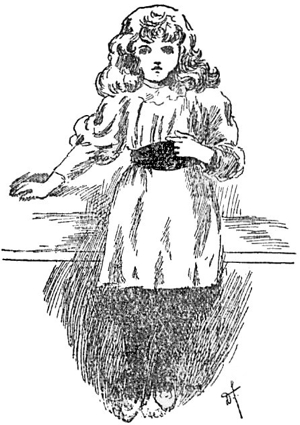
“‘OH! I HAVE A QUESTION, IF YOU PLEASE.’”
Girlie suddenly remembered about the Goo, and jumped up, excitedly saying, “Oh! I have a question, if you please.”
“Well, let’s have it,” said the Husher.
“Could you kindly tell me what is a Goo?” asked Girlie.
“A what?” said the Husher, frowning.
“A Goo,” replied Girlie.
“How do you spell it?” he asked.
“G-o-o, I think,” said Girlie.
The Husher looked perplexed. “Family Coach,” he called at last, and they all scrambled across the room again.
“Now then, what’s a Goo?” he asked anxiously.
No one spoke.
“I don’t believe she knows herself,” at last called out the Cockatoo.
“Of course I don’t,” answered Girlie, “or I shouldn’t have asked the question.”
73“It’s no use whatever asking questions,” said the Husher crossly, “if you can’t tell us whether we give you the correct answer or not; and how can you do that if you don’t know yourself? Well, you’ll all have to know by next week,” he continued, “or I shall send you all to sea.”
“What good will that do?” asked Girlie of the Penguin, who was still sitting next to her.
74“Oh! we always have to go to sea, if we don’t know things,” replied the Penguin dolefully.
Girlie was just going to ask a further question about this, when she looked up and saw that the Wallypug was wriggling nervously about on the throne, and that the Husher was glaring fiercely at him.
“Don’t jiffle,” said the Husher, “you make me giddy; what’s the matter with you?”
“I’m afraid, your Majesty,” said the Wallypug, standing up and speaking in a frightened voice, “that I shall have to present another petition.”
“Good gracious!” said the Husher, “what do you want now? you’re always wanting something or other; last week it was to have your boots mended, and the week before you wanted your hair cut, and now you want something else.”
“No, your Majesty,” said the Wallypug meekly, “it’s the same thing. If you remember, you know, you couldn’t all agree as to whether I might have it cut or not, so I had to have part of it cut, and now it really looks so very ridiculous, that I humbly beg that you will allow me to have the rest taken off.”
There was a murmuring in the room, and then some one called out, “Take your crown off.”
75The Wallypug did so, and showed that on one side of his head his hair hung over his ear, while, on the other, it was quite short.
“Well, it certainly does look rather silly,” said the Husher. “How much will it cost to have it cut?”
“Threepence, your Majesty,” replied the Wallypug meekly.
“Too much! too much!” screamed the Cockatoo angrily. “Down with the Wallypug, down with the barbers, down with everybody and everything.”
“Hold your tongue,” shouted the Husher. “Well, what shall we say to the Wallypug’s petition,” he continued, addressing the meeting.
There was a great argument in which everybody seemed to take part at once, and, at last, it was decided that the Wallypug should wait until the short hair grew the same length as the other, and then he might have it all cut together.
Girlie thought this did not seem a very satisfactory arrangement for the Wallypug, and she felt quite sorry for him when, sighing disconsolately, and pulling his crown over his head, he sat meekly down on the throne again, looking very unhappy.
“Now,” said the Husher briskly, “I beg to propose that the Wallypug invites us all to dinner.”
76“Hear, hear!” shouted all the animals.
“Oh! please, no,” said the Wallypug nervously. “My cook would be so very angry with me; he can’t bear me to bring a lot of people home unexpectedly.”
However, the animals would take no denial, so the poor Wallypug left the hall to make arrangements with his cook while the rest of the company went home to dress for dinner, leaving Girlie alone in the room.
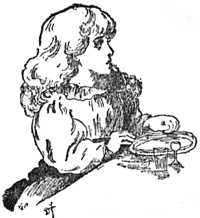
“WELL, I think they might have asked me to dinner, too,” thought Girlie, when she found herself alone. “I don’t think it’s at all polite of them to have left me by myself;” and she was just walking to the door to go out, when two ladies entered. They were beautifully dressed and wore long court trains and a quantity of jewellery. They were both very plain and did not look at all amiable.
“I suppose this is she,” said one, stopping when she saw Girlie. “We are the Wallypug’s sisters, Belinda and Lucinda,” she said, “and the Wallypug says that you are to join us at dinner, so you had better go and dress.”
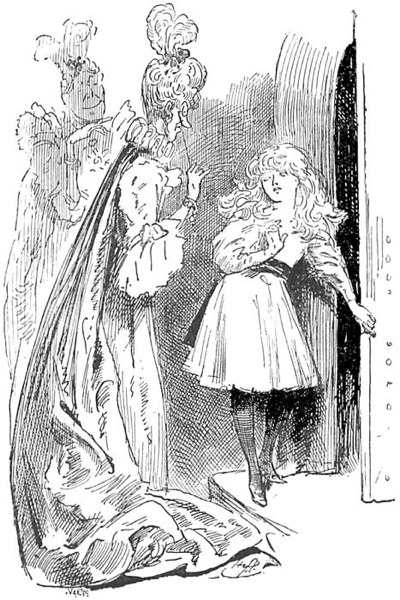
“‘I SUPPOSE THIS IS SHE,’ SAID ONE.”
“I’m very sorry,” said Girlie, “but I have no other dress here.”
78“Hum! well, you can’t go in that, that’s certain!” said Lucinda, who was the eldest. “She’s very plain, isn’t she?” she continued, turning to her sister.
“Oh! downright ugly!” replied Belinda. “No style or manners. Aren’t you going to do your hair up?” she cried, staring at Girlie.
“I’ve never had it done up yet,” said Girlie. “I’m not nearly old enough.”
“What nonsense!” said Belinda, who looked about fifty. “You don’t hear me say that. Have you ever been to Court before, child?” she went on.
“No, I haven’t,” said Girlie.
“Ah! I thought not,” said Belinda, sniffing contemptuously. “A pretty figure you’ll cut in Society. Where are your jewels?”
“Oh! I haven’t any!” said Girlie. “I have a little gold chain and a locket, but Mamma will never let me wear them; she says that jewellery is not suitable for children.”
“Stuff and nonsense!” said Belinda impatiently. “What accomplishments have you?” she asked after a pause.
“I can play the piano a very little,” said Girlie, “and I am taking singing lessons.”
“Is that all?” asked Belinda.
79“I can recite one or two poems,” said Girlie.
“Recite!” said Lucinda in a commanding tone, and the two old ladies sat down and fanned themselves affectedly.
Girlie thought for a moment or two, and then stood up and repeated the following words, although she did not at all remember ever having heard them before:—
“There! there! that will do,” interrupted Belinda, “that’s horribly rude and you recite it very badly. Don’t you know anything else?”
“I know ‘The Lobster and the Buttercup,’” said Girlie.
80“Repeat it then,” cried both sisters at once.
Girlie started again:—
81“Well, that’s a little better, certainly,” said Belinda when she had finished. “But why is it called ‘The Lobster and the Buttercup?’”
“I don’t know,” said Girlie, “and I can’t think where I learned it; the words seemed to come into my head all at once. I’m afraid it’s very foolish,” she added apologetically.
“Oh! it’s positively absurd!” agreed Belinda, “but there, what can you expect from a person who has never been in Society? There goes the dinner gong,” she continued, at the sound of a gong from the next room, and, followed by Lucinda and Girlie, she led the way to the door at the side of the throne.
In the ante-room adjoining Girlie found the Doctor-in-law putting on a pair of white kid gloves.
“May I take you in to dinner?” he asked, bowing politely and offering his arm.
“Thank you very much,” said Girlie, laying her hand on his arm and feeling quite “grown up.”
“This way,” said the Doctor-in-law, pushing aside some heavy curtains and leading Girlie to a seat at the long table which reached the whole length of the handsome Dining Hall in which they now found themselves.
82The Wallypug and most of the guests were already seated, and Girlie recognised a great many of the creatures she had seen in the other room, when she looked around.
“What are we waiting for?” asked the Doctor-in-law of one of the Footmen, of whom there seemed to be a great number. They were all lizards and dressed alike in handsome liveries of green and gold.
“There are not nearly enough plates to go round,” said the Footman in an anxious whisper, “and so we have had to send out to borrow some;” and he hurried away, counting the guests on his way, and then making a calculation on his fingers, and shaking his head mournfully all the while.
After everybody else was seated, the King’s Minstrel came strutting into the room, dangling his hands as usual, and nodding in a patronising kind of way to Girlie; he threw himself down in an unoccupied chair next to her.
“Charming menu, isn’t it?” remarked the Doctor-in-law, handing her a highly decorated card on which Girlie read the following words:—
83
84And on the other side of the card Girlie read:
“Oh! I’ve heard of hunting for a needle in a bottle of hay,” thought Girlie.
“Do you know why it’s called a menu?” asked the Doctor-in-law, looking over her shoulder.
“No,” said Girlie. “It’s French for something, isn’t it?”
“No,” said the Doctor-in-law, “it’s English, and it’s called a menu for two reasons; first, because it’s what they mean you to have, and, secondly, because it’s between me and you.”
“Oh!” said Girlie. “And why is it called a Fancy Dinner Party, please?” she asked.
“You’ll see directly,” replied the Doctor-in-law, as the Footman came round with the soup plates.
“Thick or clear, Miss?” he asked when he came to Girlie.
“Thick, please,” said Girlie, “because,” she thought, “Air soup or Water broth must be so very thin.”
85The Lizard quickly put down a hot, empty plate in front of her, and then hurried away.
“Have you got what you fancied?” asked the Doctor-in-law politely.
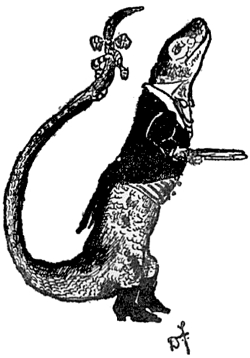
“THE FOOTMAN CAME ROUND WITH THE SOUP PLATES.”
“I haven’t anything at all but an empty plate,” said Girlie.
“What did you fancy?” asked the Doctor-in-law.
“Mock treacle,” said Girlie, referring to the card.
“Well, now, you must fancy that you have got it,” said the Doctor-in-law. “That’s why it’s called a Fancy Dinner Party,” he continued, breaking some imaginary 86bread into his empty soup plate and then pretending to eat some with a spoon.
Girlie saw that every one else was doing the same sort of thing, so she thought that she had better follow their example.
“Although,” she thought, “I should think it must be very unsatisfactory, if you are really hungry.”
“Delicious, isn’t it?” asked the Doctor-in-law, wiping his lips with his serviette.
“There doesn’t seem to be much flavour in it,” said Girlie doubtfully.
“Ah! you should have fancied real turtle, like me,” said the Doctor-in-law.
“But I don’t see it down,” said Girlie, referring to the card again.
“Oh! that doesn’t matter in the least,” replied the Doctor-in-law. “You can fancy just whatever you like; it doesn’t make the slightest difference. That’s the best of these Fancy Dinner Parties.”
Girlie thought that, at least, it must be a very cheap way of entertaining your friends, but she did not like to say so for fear of being thought rude.
“Have you found out what a Goo is?” she asked presently, while the Footmen were removing the plates.
87“Oh, I knew all along, my dear,” said the Doctor-in-law smilingly.
“Oh! did you? What is it, please?” asked Girlie, who thought that she was really going to find out at last.
“I cannot possibly tell you under four shillings and ninepence-three-farthings,” said the Doctor-in-law. “But I’ll tell you twice for six shillings, if you like,” he added considerately.
“Oh dear!” said Girlie, greatly disappointed. “I’ve told you before that I really have no money at all with me.”
“Then,” said the Doctor-in-law, pushing his chair back and getting up indignantly, “I don’t think that you are at all a respectable person, and I shall certainly not sit by you any longer. You are the most unprofitable person that I have ever met with,” he added over his shoulder as he walked away.
“Oh dear!” thought Girlie, “now he’s offended with me because I haven’t any money.” But she consoled herself with the thought that it was really rather fortunate that she hadn’t; “For I am sure he would soon get it all away from me, if I had,” she said to herself.
Next to where the Doctor-in-law had been sitting 88was a little gentleman in brown, with only one eye and a very turned-up nose, who kept staring at Girlie with his one eye in a very confusing manner. Girlie fully expected him to say something, but he only continued to stare.
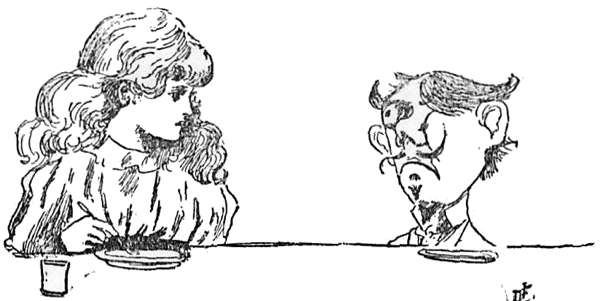
“KEPT STARING AT GIRLIE IN A VERY CONFUSING MANNER.”
“Perhaps he wishes me to say something first,” she thought. “I hope you are enjoying your dinner, sir,” she said aloud, very politely.
“A continual mind is a contemptuous feast,” remarked the little man, with a sneer.
“I’m afraid I don’t understand you,” said Girlie.
“Of course not—nobody ever does,” said the little man; “that’s why I’m called an Enigma. I can say 89things far more imcomprehensibly misunderstandable than that,” he added.
“Oh, please don’t!” said Girlie. “I can’t follow you as it is.”
“Very well, then,” said the Enigma. “Pray allow me to meditate in silence;” and he folded his arms and sat perfectly still, staring up at Girlie as before.
“Pass his plate,” said the King’s Minstrel, who had been greedily pretending to eat the whole time, and had not spoken a word to any one before. “He won’t want any more.”
Girlie passed the plate, which was perfectly empty. “So it can’t possibly do him any harm,” she thought.
“I wonder what he fancied,” said the King’s Minstrel, looking first into the plate and then turning it over and looking underneath.
“Food for reflection. It will do you good,” said the Enigma, who had overheard him.
The King’s Minstrel nervously dropped the plate. “It doesn’t agree with me,” he said hurriedly.
“H’m! I don’t wonder at it,” remarked the Enigma contemptuously, and then sat still, staring as before.
There was an awkward silence for some time, and, 90at last, Girlie asked the King’s Minstrel whether he had found out what a Goo was yet.
“Oh yes,” answered the King’s Minstrel, immediately regaining his conceited air. “My uncle, the Duke, keeps an enormous quantity of them.”
“Oh! what are they like, please?” asked Girlie eagerly.
“Oh, the usual kind; some large and some small,” said the King’s Minstrel evasively.
“But what are they?—birds, or animals, or what?” asked Girlie.
“Well, to tell you the truth,” said the King’s Minstrel, “they are neither one nor the other, but rather more like the other than the one.”
“How many legs have they?” asked Girlie.
“A few,” said the King’s Minstrel.
“Oh dear! How many do you mean?” asked Girlie, who was getting rather impatient.
“Some at each corner,” replied the King’s Minstrel solemnly; and then, taking up her plate, he looked into it and inquired what she had fancied.
“Oh! I forgot to fancy anything,” said Girlie. “I can’t see that it makes any difference.”
“Very well, then, I shall fancy hothouse screeches,” 92said the King’s Minstrel, by which Girlie knew that they had reached dessert, and that the Dinner Party would soon be over.
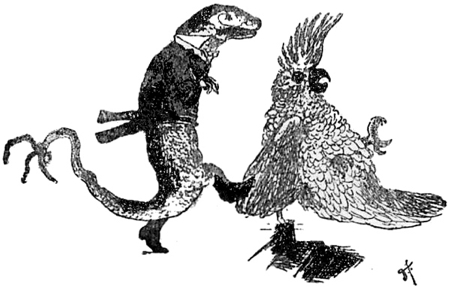
“WAS BEING TURNED OUT OF THE ROOM.”
Just then a loud commotion arose at the other end of the room, causing all to raise hastily from their seats in alarm. It turned out that the old Cockatoo, who had been arguing with the black Poodle as to what the Wallypug should be compelled to fancy, had at last savagely bitten him, and was being turned out of the room, screaming and kicking; and, to make matters worse, in the midst of all this confusion the lights went out.
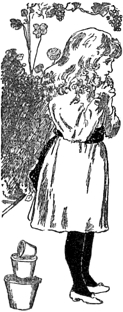
GIRLIE was greatly alarmed when she found herself in the dark, the more so that the noise, which had been going on all around her, suddenly ceased in a most mysterious manner. She called aloud once or twice, but received no reply, so she began to grope about in the dark, trying to find her way out. After knocking herself several times against the chairs and other furniture in her endeavours, she, at last, saw a faint light coming from underneath a door a short distance down the room. Feeling her way carefully to it and pushing it open, she found that it led into a large conservatory. An old man who, she thought, must 94be the gardener, was potting some tall plants before a low bench at the further end of it, and, to Girlie’s great surprise, she could see that the sun was shining brightly.
“Now, that’s very curious,” she thought; “I certainly thought that it was night time. I’m sure that the gas was alight while we were having dinner. I’ll ask this old gentleman.” “Could you please tell me what time it is?” she said aloud, walking over to the Gardener.
“We haven’t got any here, Miss,” he replied mournfully.
“Any what?” asked Girlie.
“Any time, Miss. Haven’t you heard of people not having any time before?” said the Gardener.
“Yes,” said Girlie, “people that are in a hurry sometimes say they haven’t any time, but you don’t seem to be in a hurry about anything.”
“Oh, that isn’t the reason why we haven’t any time, Miss; it’s because we’ve lost ours. You’ve heard of people losing time, haven’t you?”
“Yes,” replied Girlie, “I have.”
“Well, if you’ll sit down here, Miss,” said the Gardener, turning a large flowerpot upside down for her to sit on, “I’ll tell you how we lost ours. It was like this here,” he continued, after Girlie was seated. “We’d kept our 95time here for a long while, when one day the young man as they calls the King’s Minstrel comes along, and he says, says he, ‘You don’t keep your time properly,’ he says. ‘What do you mean?’ we says. ‘Well,’ he says, ‘you don’t beat him, do you?’ ‘No,’ we says. ‘What do we want to beat him for?’ we says. ‘Oh,’ he says, ‘you have to be very strict with your time,’ he says, ‘and you ought to beat him to make him go quicker,’ he says. Well, Miss, some of us, we didn’t hold with these new-fangled notions at all, but some of the others wanted to try it, so, after a bit, we took to beating our time regular, we did, and, for a little while, Miss, he did go quicker, so quick, in fact, that we couldn’t keep up to him at all, but were always behind him. You’ve heard of people being behind time, haven’t you, Miss?”
“Oh yes!” said Girlie, “go on, please.”
“Well, Miss, after a bit our time he began to go slower again, and by-and-by he slowly passed away altogether.” The Gardener paused and looked at Girlie as though he expected her to say something.
“Where did he go to?” she asked.
“We never knew, Miss; we hunted high and low for him, but he never came back again, so now we haven’t any time at all worth speaking of. The King’s 96Minstrel, he said as how he would teach us to make time, but bless you, Miss, the time we gets nowadays ain’t no ways to be compared to the old time what we used to have, no more than string is like tobaccer, Miss. Why, our time is awful mixed; look at us now, for example, we’re in the middle of next week to-day, and to-morrow is as likely as not to be the day before yesterday. That’s why I’m cutting these plants down and putting them into smaller pots, you know, Miss. Then take the length of the days,” he went on, “some is that short as you don’t know how to get your clothes on before it’s time to go to bed again, and others is that long as you’re obliged to have eight or nine dinners a day, or you would starve. Then the days of the week, too, there’s no depending on them; if you’ll believe me, Miss, I’ve known no less than thirteen Fridays in one week, which is most unlucky. And last year Midsummer day was only two days before Christmas, after which we had three New Year’s days running. As for birthdays, Miss, it’s quite impossible to tell how old you are. My son Bill, for instance, has had ever so many more birthdays than me, owing to his having been born in March, and a little while ago it kept on being March over and over again, till I should think that poor boy is a hundred, if he’s 97a day. Then, again, how are you to know what wages to expect when you can’t tell yourself from one day to another whether you’ll have been in a place three years and nine months or only two months and a day?”
“It certainly must be very puzzling,” said Girlie, who had been listening most attentively.
“Puzzling ain’t the word, Miss,” said the Gardener. “Why, look at my poor daughter, now, she was to have been married on the 19th of June, and dash me if there’s been any 19th of June for these last twenty years or more, and now her husband that was to be, young Spuffles, the Miller’s son, has gone and failed through having put some Mustard in with his flour by accident.”
“Oh, I heard the Miller’s son had some mustard,” remarked Girlie, remembering the Schoolmistress’s question.
“Where did you hear of it, Miss? if I may be so bold,” asked the Gardener.
“Oh, it was one of the questions at the Public Meeting,” said Girlie. “The Schoolmistress asked ‘Has the son of the Miller the mustard of the daughter of the Gardener?’”
“It’s like her imperence,” said the Gardener; “but there, she always was a busy body, she was. Drat the 98hat!” he continued, as a high hat dropped down with a loud crash on the top of the conservatory and then rolled off on to the lawn. “They’re having a Hat Hunt somewheres,” he went on, “and this here one has escaped them, I expect.”
“Whatever is a Hat Hunt?” asked Girlie curiously.
“Oh, it’s a kind of game, Miss, that they play hereabouts. It’s rare fun for them as can run quick.”
“How do they play it?” asked Girlie.
“Why, Miss, it’s like this here; they wait till there’s a high wind a-blowin’, and then they throws a lot of high hats up into the air and try to catch ‘em as they’re flying about. It’s wonderful, Miss, how them hats do dodge you, to be sure. I suppose now, Miss, you’ve never tried to catch a hat when it’s a-blowin’ about, have you?”
“Oh yes, I have,” said Girlie. “My own blew off the other day, and I had to run a very long way before I could catch it. It would be very easy to catch this one, though,” she said, looking out on to the lawn where the hat was lying quite still just outside the door.
“Not so easy as you think, Miss,” said the Gardener; “you just try.”
99Girlie opened the door and stepped out, and was just going to pick up the hat, when it started rolling off again. “Bother!” she said, running after it.
“You’d better take this rake with you, Miss, if you want to catch it,” called out the Gardener, who was watching her from the door.
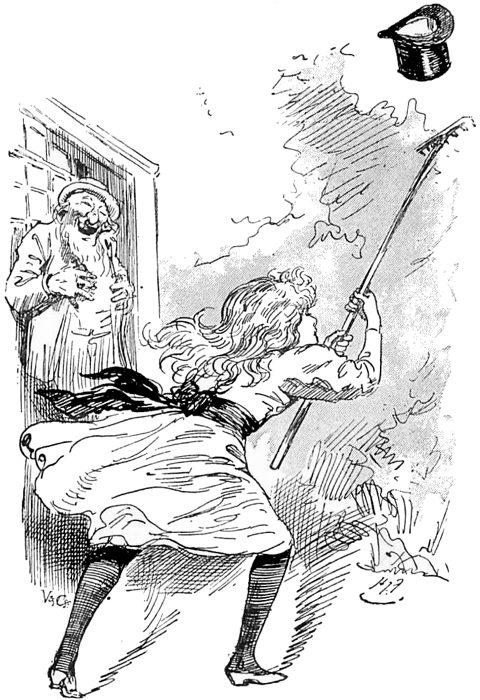
“SHE COULD HEAR THE OLD GARDENER LAUGHING LOUDLY AT HER.”
Girlie ran back for the rake and then hurried after the hat, which had stopped under a rose bush. “I’ve got it this time,” she thought when she came up to it; but, just when she stretched out her hand to take hold of it, a sudden gust of wind blew it up into the air again, and it went sailing merrily off in a most provoking manner. Girlie made two or three ineffectual dabs at it with the rake, but could not reach it—she could hear the old Gardener laughing loudly at her while he watched her from the conservatory door, and it made her determined to catch the hat, if she possibly could. By-and-by it settled down on the top of a low yew hedge at the end of the lawn, and Girlie hurried after it, grasping her rake firmly in her hand. When she reached the hedge she struck out at it rather crossly with the rake, only to see it go flying off into the meadow beyond, while a voice on the other side of the hedge called out in an indignant manner,—
100“I say there, pray be careful what you’re about; do you know that you very nearly had my head off?”
“I’m sure I’m very sorry,” said Girlie, peeping through the hedge and trying to see who was speaking to her. She could see nobody, however, so she ran to a little gate which she could see in the hedge, and then walked slowly back on the other side to where the voice had proceeded from.
“Why, he’s gone,” she said aloud, when she got there and found no one in sight.
“No, I’m not, I’m here,” said the voice plaintively; “can’t you see me?”
Girlie looked about her but could see no one. “Who are you, please?” she asked.
“I’m supposed to be a joke,” said the voice, “though I have my doubts about it; nobody has ever been able to see me yet.”
“That must be very awkward for you,” said Girlie pityingly.
“Yes,” said the Joke, “it is. I’m afraid I shall turn into a Paradox soon, if it goes on much longer.”
“Gracious! what a long word,” exclaimed Girlie. “Whatever is a Paradox?”
“When a thing is what it isn’t and yet isn’t what 101it is, it’s a paradox,” said the Joke. “And since I am beginning to think it’s no joke to be a joke, I suppose I must be a kind of paradox,” he added wearily.
Girlie couldn’t think of anything comforting to say, though she really felt very sorry for the poor Joke, “for it must be so very uncomfortable to be invisible,” she thought, “and not even to know yourself what you really are.”
“Here comes the Royal Microscopist,” said the Joke a minute or two later. “You might ask him to try and see me with his microscope, will you please?”
Girlie looked across the meadow and saw the Royal Microscopist and the Doctor-in-law coming along arm-in-arm. The Doctor-in-law was triumphantly carrying the hat, which he had evidently succeeded in capturing.
“They are called chimney-pot hats,” he was explaining, “because they blow about in windy weather just as chimney-pots do. That will be two and ninepence, please;” and he stopped and held out his hand while the Royal Microscopist fumbled about in his pocket for his purse. He had just handed the Doctor-in-law half a sovereign and was waiting for the change, when he saw Girlie. Hastily putting on his spectacles, he hurried over to her while the Doctor-in-law pocketed the money.
102“Bless me!” he cried, staring at her curiously; “the Human Noun, I do declare! How very singular!”
“I don’t see why you should think it singular at all,” said Girlie boldly.
“Don’t you, my dear? Well, you are singular, very singular—indeed, most singular—because, you see, there’s only one of you. Now, if there had been two of you, you know, you might have been plural, if you wished. Dear me! what have you done with your Case?” he asked, peering at her over the top of his spectacles.
“My case! What do you mean?” asked Girlie.
“Every respectable Noun is expected to carry a Case,” said the Doctor-in-law; “you ought to know that by this time, if you’ve ever been to school. What Mood do you think she’s in?” he asked, turning to the Royal Microscopist.
The Royal Microscopist stared at her a minute or two over his glasses, and then said in a decided voice, “Very disagreeable Mood. But then, there’s some excuse for her, you know; she’s only a Third Person, and the Third Person is always disagreeable; that’s why ‘two’s company and three’s none.’”
“Why should I be the Third Person, pray?” asked Girlie, who did not at all approve the way in which they were talking about her.
103“I’m the First Person, my friend here is the Second Person, and so you must be the Third,” replied the Royal Microscopist.
“There’s only one thing wrong about that,” said the Doctor-in-law; “I am the First Person.”
“Now, that’s too bad of you, Doctor-in-law,” said the Royal Microscopist. “You know we agreed that we were to take it in turns to be the First Person.”
“We didn’t do anything of the sort,” said the Doctor-in-law angrily. “I’m always the First Person.”
“Oh! please don’t quarrel,” said Girlie. “Besides, I think I ought to be the First Person, considering that I was here first.”
“Ha-ha-ha! she’s got the best of you there,” laughed the Joke.
The Royal Microscopist and the Doctor-in-law both started and looked about nervously.
“What’s that?” whispered the Royal Microscopist in an alarmed voice.
“Only a Joke,” replied Girlie. “He wants you to try and see him; he’s afraid he’s turning into a para—para——”
“Parachute,” suggested the Doctor-in-law.
“No, I don’t think that was it,” said Girlie. “What 104did you say you were turning into?” she asked of the Joke.
There was no answer.
“He seems to have gone away,” said the Doctor-in-law.
“Ha-ha-ha! then I can see it,” laughed the Royal Microscopist; “that is the joke. He waits till you want him, and then he goes away,—ha-ha-ha! Very funny, very funny indeed.”
“I don’t think it’s at all a good joke,” said Girlie.
“Of course not, my dear,” said the Royal Microscopist; “it’s a very bad joke, a very bad joke indeed, to run away just when we wanted him. But it’s very funny that one should not be able to see him till after he had gone; that’s really funny, very funny indeed—ha-ha-ha! hee-hee!”
“Don’t go on like that or you’ll have a fit,” remarked the Doctor-in-law crossly.
“Well, what if I do?” replied the Royal Microscopist. “I suppose I can have a fit, if I like. I’m not obliged to ask you, am I? I’ll have two, if I wish. I’ll have the measles, if I like, and I’ll have the scarlatina and the croup, if I want to—so there!” and the Royal Microscopist stamped his foot pettishly.
105“Don’t be absurd,” said the Doctor-in-law; “and come along and buy your Excuse, or you will be too late.”
“Bless me, yes! so I will,” cried the Royal Microscopist.
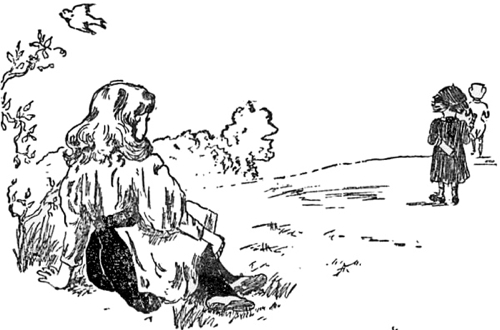
“THE OLD GENTLEMAN HURRIED OFF.”
“I’m going to buy an excuse for not having found out what a Goo is,” he hurriedly explained to Girlie. “And this is Thursday—early-closing day, you know; so, if I don’t hurry up, I shall be too late. Good-bye. See you later;” and, taking the Doctor-in-law’s arm again, the old gentleman hurried off, stopping half-way across the meadow to call out, “Can you run?”
106“Yes!” Girlie shouted back, wondering what he wanted to know for.
“Very well, then; we’ll arrange a Human Race for you by-and-by,” returned the Royal Microscopist, hurrying down the hill and out of sight.
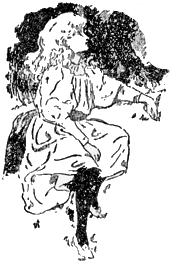
GIRLIE sat down under a tree in the meadow after they had gone. It was very pleasant resting there in the shade, and she felt quite happy and contented, and was just making up her mind to gather some of the large marguerites, of which there were a great many growing amongst the grass, when a loud “S-q-u-a-a-k” above her head made her look up. A large Crow was sitting up in the tree gazing down at her.
“I thought that would make you look up,” he said. “If it hadn’t I should have dropped an acorn down on to your nose.”
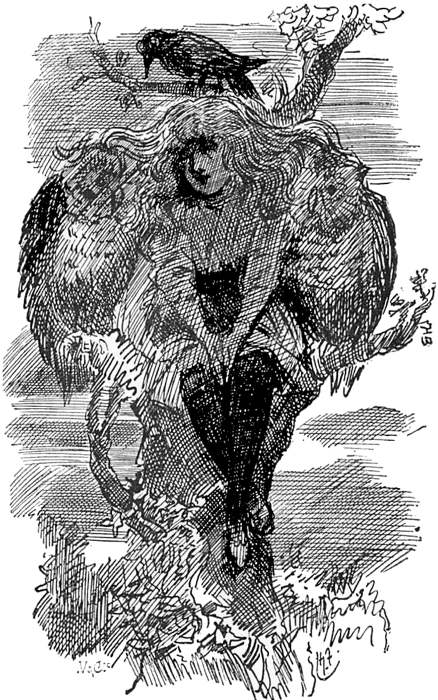
“‘NOW LET’S GO TO SLEEP.’”
109Girlie felt very glad that he had not found it necessary to do so, and civilly asked him what he wanted.
“Well, you see,” he said, “my spectacles have got very dull, and I thought that, perhaps, you wouldn’t mind lending me your handkerchief to polish them up with.
“Oh! certainly, with pleasure,” said Girlie amiably. “I wonder how he keeps them on?” she thought. “I’ve never heard of a bird wearing glasses before.”
But by this time she had got so used to strange things happening, that she was scarcely surprised at anything.
“Thanks,” said the Crow, “bring it up here, please.”
“How can I?” said Girlie. “I can’t climb right up there.”
“Of course not,” replied the Crow; “you must fly up.”
“How absurd!” laughed Girlie. “I can’t fly, I’ve no wings.”
“Can’t fly!” repeated the Crow in a tone of surprise, gazing curiously down at her. “Why, then, you must be a pig,” he said decidedly, after a minute or two.
“I’m sure I’m not,” said Girlie, feeling very indignant.
“But you must be,” said the Crow. “Pigs can’t fly, you know, and if you can’t either, you must be a kind of pig. Oh, you needn’t get so angry about it,” he continued, 110when Girlie began to remonstrate, “pigs are very nice in their way, if it wasn’t for their pride.”
“I didn’t know that pigs were proud before,” said Girlie; “I’m sure they’ve nothing to be proud of.”
“It’s just the people that have nothing to be proud of who usually fancy themselves most,” said the Crow; “look at the King’s Minstrel, for instance.”
“Well, yes, he’s proud enough, certainly,” said Girlie, laughing in spite of herself. “Do you know him?”
“Know him?” replied the Crow, “I should rather think I do. Why, I’ve known him ever since he was a boy, and he was as proud and stuck-up as an old tin kettle then.”
“As an old tin kettle,” repeated Girlie, “why, however can an old tin kettle be proud.”
“Haven’t you ever heard of the pride of a kettle?” said the Crow, who seemed surprised; “why, they’re the proudest things out. I knew one once,” he continued, “who came to a terrible end through his pride and folly. Shall I tell you about it?”
“I should like you to very much,” said Girlie, “if you wouldn’t mind coming down here, for it is making my neck ache dreadfully to keep looking up at you.”
The Crow obligingly flew down and, perching on the 111stump of a tree near to where she sat, he repeated the following story:—
“Poor things,” said Girlie, laughing; “but it served them right, though, didn’t it, for thinking such a lot of themselves?”
“Certainly it did,” replied the Crow, “and, besides that, the kettle had had one warning before. Pride always has a fall, you know, and he had had one—that was how he came to get the dent in his left side. Were you ever on speaking terms with a kettle?” he inquired.
“No, never,” said Girlie, laughing at the idea.
“No, I suppose not,” said the Crow in a pitying voice; “they are rather particular to whom they speak, and I suppose they would draw the line at a pig.”
“I tell you——” began Girlie; but the Crow didn’t allow her to finish the sentence.
“It’s their voices they are so proud of,” he went on. “I suppose you’ve heard them sing, haven’t you?” he asked.
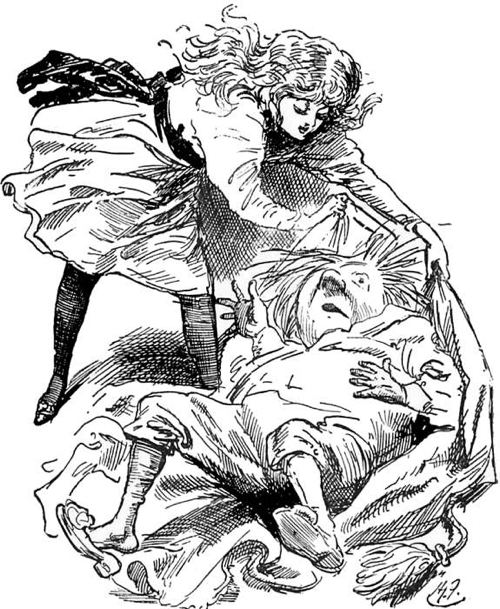
“GIRLIE KINDLY RAN TO HIS ASSISTANCE.”
114“No, I haven’t,” said Girlie.
“Never heard a kettle sing?” asked the Crow in surprise.
“Oh, yes, I have,” said Girlie.
“I was going to say,” remarked the Crow, “why, I’ve known them to simply boil over with indignation when their singing hasn’t been properly appreciated. You might as well give me that handkerchief now,” he added, holding out his claw.
Girlie gave it to him and watched him while he rubbed away at his glasses, which he held in his beak.
“What do you use them for?” she asked presently.
“Oh! I’m out hunting for a Goo,” answered the Crow, “and, being rather short-sighted, I am obliged to wear glasses.”
“Oh, do you know what a Goo is?” asked Girlie eagerly.
“Yes,” said the Crow, “our family have come to the conclusion that it is a kind of worm, an enormously large worm, because everybody is so very anxious to find it, and a worm being the only thing in the world worth troubling about, it must be a worm. If it isn’t, it isn’t worth looking for, that’s all,” he added.
“O’ugh! I am sure I shouldn’t like to find one, then,” said Girlie, shuddering.
115The Crow lifted up his eyebrows (such as he had) in surprise.
“There’s no accounting for taste,” he said presently, in a sarcastic voice; “and pigs—but there, no matter! I won’t finish it. Hush! what’s that?” he went on, as a great bell tolled in the distance. “The curfew,” he said, after listening for a minute, “now we shall all have to go to bed.”
“But how can we?” cried Girlie in alarm.
“There are plenty of trees,” suggested the Crow.
“But I can’t sleep in a tree,” said Girlie.
“Oh, can’t you? well, you’ll have to to-night, anyhow,” said the Crow. “The Watchman will be along presently and, if he catches you awake, he will extinguish you, and then where will you be?”
Girlie thought that sounded very terrible, so she began looking about for a tree with branches low enough for her to climb into.
She found one presently that she thought she could manage, and, after several efforts, she succeeded in reaching one of the lower branches. On the branch that she had selected were two owls huddled close together.
“I say, further up there!” shouted the Crow, giving one of them a poke as he settled down beside him.
116The Owl immediately opened his eyes very widely and tried to look as though he had not been to sleep at all.
“What’s that?” he said, staring hard at Girlie, who was sitting uncomfortably on the branch.
The Crow whispered something in his ear and Girlie could just catch the word “Pig.”
“Is she really?” said the Owl, looking surprised.
“Well, Pig! Do you happen to have any mice about you?” he said, peering at her curiously.
“Good gracious, no!” said Girlie, frightened at the very idea.
“One would think you didn’t care for mice by the way in which you speak,” said the Owl crossly.
“I shouldn’t be at all surprised if she didn’t,” remarked the Crow; “her tastes are most peculiar.”
“She’s perching very awkwardly, too,” said the Owl, staring at her with a puzzled air. “What’s the matter with her?”
“I suppose Pigs can’t perch properly,” remarked the Crow.
“You’re very rude, both of you,” said Girlie, completely losing her temper.
“Yes, four perches make one rood,” said the Crow, counting them.
117“I suppose you think that’s clever,” said Girlie, “but it isn’t, for four perches don’t make one rood—it’s forty.”
“It’s the same thing,” said the Crow, “isn’t it?” he asked, turning to the Owl, who had shut his eyes again.
“Precisely,” he replied, opening one eye only, which made him look exactly as if he was winking.
“How do you make that out?” asked Girlie.
“I could show you, if I had a piece of paper and a pencil,” said the Crow. “How do you write forty?” he asked.
“Four and a nought,” said Girlie promptly.
“And what does nought stand for?” asked the Crow.
“Nothing,” replied Girlie.
“Well, then, what’s the use of making a fuss about nothing?” said the Crow; “and, besides, if you’re not a Pig, prove it by perching properly.”
Girlie felt that she ought to do something to show them that she really was not a Pig, so she drew her feet up under her and tried to sit as much like the Owl as she could. She felt dreadfully uncomfortable, however, and was afraid every moment that she should fall to 118the ground. “Oh, I really can’t do it any longer,” she said after a little while, resuming her former position.
The Owl and the Crow looked at each other meaningly.
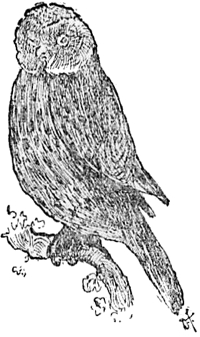
“‘PRECISELY,’ HE REPLIED.”
“I said she was,” nodded the Crow, “and that settles it. Now let’s go to sleep, or we shall have the Watchman catching us talking,” and he took off his spectacles and tucked them under one wing, and then, popping his head under the other, was soon fast asleep.
Girlie nestled up as close to the Owl as she could 119for he looked so soft and warm, and, resting her head cosily against his fluffy feathers, was soon asleep herself. Perhaps it was because of the strange position in which she was sleeping, but certainly from some cause or other, she had a most alarming dream. She thought that she had fallen from the tree and couldn’t get up again, and that the Watchman (who seemed to be a dreadful old man with an enormously long nose, wearing a long coat with ever so many little capes to it, and carrying a lantern in one hand and an immense extinguisher in the other) came along and found her sitting there. He seemed to be very angry that she was not asleep, and, crying out in a loud voice, “Lights out,” popped the great extinguisher over her head. Girlie felt half-suffocated and was just wondering whether she would really go out like a candle, and was thinking that she should know now what people meant when they spoke about being very much put out, when she suddenly awoke and found, to her great relief, that it was only a dream. It was broad daylight again and the Crow had disappeared, carrying Girlie’s pocket-handkerchief away with him.
“I suppose I ought to wake these owls up,” she thought, looking at them snuggled close to her. She 120gave the one on her right a little shake and he immediately opened his eyes very widely, as before.
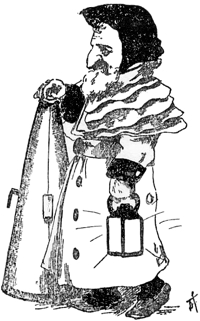
THE WATCHMAN.
“Well, what is it?” he asked sharply.
“It’s time to get up,” said Girlie.
“It isn’t,” said the Owl. “Fluffy and I are going to sleep all day.”
121“Oh, is that his name—Fluffy?” repeated Girlie, looking at the other Owl. “What’s yours?”
“Stuffy,” said the Owl, yawning.
“Oh!” said Girlie. “Shall I tell you mine?” she asked, wishing to be sociable.
“You can, if you like,” said the Owl.
This didn’t sound very encouraging. “But, perhaps, he isn’t quite awake yet,” thought Girlie, remembering that people are often rather cross if spoken to before they are quite awake. “My name is Girlie,” she said aloud.
“H’m! What a stupid name!” said the Owl. “What does it mean?”
“I’m sure it isn’t stupid,” cried Girlie indignantly; “it’s a very pretty name.”
“It’s a silly name for a Pig,” persisted the Owl.
“But I tell you I’m not a Pig,” said Girlie, getting quite cross.
“Yes, I know you say so,” said the Owl sarcastically; “but I can’t see the difference myself. You can’t perch, you can’t fly, you haven’t feathers, and you don’t like mice. If you’re not a Pig, I should just like to know what you are. Not that it matters in the least, though,” he went on, before Girlie could reply. “And now do 122leave off talking, for I want to get to sleep again.” And he settled his head down between his shoulders and closed his eyes.
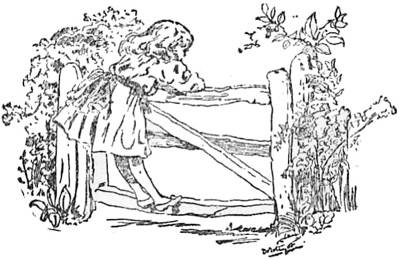
“RAN TO THE GATE AND LOOKED OVER THE TOP.”
He evidently did not wish to continue the conversation, so Girlie scrambled down from the tree and began to walk towards the gates at the farther end of the meadow, gathering some marguerites on her way.
“I wonder what day it is?” she thought. “Let’s see, it was Wednesday afternoon when I first came here; then I had tea (or breakfast—which was it?) at the Crocodile’s; then late dinner at the Wallypug’s; and then it was daylight when I got into the conservatory, so I suppose that must have been Thursday; and now I’ve 123been to sleep; so this must be Friday. What a short day Thursday must have been, though,” she thought—“about an hour and a half long,” she decided, after thinking it over; and then, hearing a noise in the roadway, she ran to the gate and looked over the top.
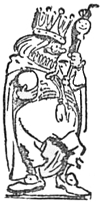
IT was the Wallypug running down the road at a furious pace. He had his big crown tucked under one arm and his royal cloak caught up under the other. Although he was evidently in a very great hurry, he politely tried to bow (without stopping) when he saw Girlie. The consequences, however, were most disastrous, for, completely losing his balance, he stumbled forward head over heels and then fell flat on his back, while his crown went rolling away into the ditch at the side of the road. His cloak had somehow become entangled with his legs, preventing him from getting up, so he lay there kicking and struggling in the most ridiculous manner imaginable.
Girlie kindly ran to his assistance, and, although bursting with laughter, somehow or other managed to keep a grave 125face while she tried to disentangle the cloak from his legs.
“I hope you have not hurt yourself much,” she said when the Wallypug at last struggled to his feet.
“Oh no, your Majesty, thank you,” he said breathlessly. Then, nervously looking around him, he said in a solemn voice, “I do hope, though, no one else saw me fall, for I am liable to a fine of three and sixpence for being undignified in public, and I am afraid that I must have looked rather undignified while I was lying on the ground. Oh dear! wherever is my crown?” he continued, looking about him anxiously.
Girlie kindly fetched it from the ditch, which was fortunately a dry one, and handed it back to him.
After examining it carefully, the Wallypug drew a small piece of wash-leather from his pocket and began to polish it up, remarking that he had always to keep the regalia bright himself.
“Where were you going to in such a hurry?” asked Girlie, while the polishing operations were going on.
“Why, to the Excursion, your Majesty,” said the Wallypug. “This is Bank Holiday, you know, and there is to be an excursion to the seaside. Aren’t you going?”
126“I should like to very much,” said Girlie, “but I have no money with me.”
“Oh, it’s quite free, your Majesty,” said the Wallypug. “I have to pay for it all, you know. I always have to provide an excursion for the people on Bank Holidays, and one more or less won’t make the slightest difference, so you are quite welcome to go.”
“Thank you very much indeed,” said Girlie. “What time does the train start?”
“I haven’t the remotest idea, your Majesty,” said the Wallypug. “We never do know when the trains are going to start here; the Porter and the Station-master settle all that between themselves.”
“Then however do you know at what time to get to the station?” asked Girlie.
“We don’t know, your Majesty,” said the Wallypug. “So we just get there as early as we can and then take our chances as to how long we have to wait. How does this look now?” he continued, pulling his crown over his head and drawing himself up with the most comical attempt at looking dignified.
“Very nice, indeed,” said Girlie, trying hard not to laugh.
“Very well, your Majesty, let’s be going then,” said 127the Wallypug, leading the way down the road. “I’m afraid it’s going to rain,” he said a minute or two later, looking anxiously up into the sky. “We had better hurry to the station,” and, taking Girlie’s hand, they began to run. They had not gone far, however, before Girlie felt a drop of rain on her forehead, then another, and another.
“We shall have to shelter somewhere,” said the Wallypug, looking about for a tree to stand under.
“Isn’t that a house?” said Girlie, pointing further down the road. “Perhaps they would let us stop there till the shower is over.”
“Oh yes, your Majesty; that is Madame Penguin’s shop. I daresay she would be quite pleased to see us. Let’s hurry on.”
So they hastened forward and soon reached the little shop which stood at the corner of four cross roads. It was a little, low, one-storied sort of cottage built of stone. In the windows were a number of odd-looking packages and envelopes, and over the doorway there swung a sign bearing the words:
128The Wallypug opened the door, causing the little bell fixed to it to tinkle violently.
Madame Penguin (who turned out to be the same Penguin Girlie had seen at the Public Meeting) came hurrying out of a little room at the back of the shop.
“Oh! how do you do?” she said when she saw Girlie, “and how are you, Wallypug?”
“Quite well, your Majesty, thank you, quite well,” said the Wallypug. “We were caught in the shower, and thought that, perhaps, you wouldn’t mind us sheltering here for a little while.”
“Delighted, I’m sure,” said Madame Penguin kindly, bustling about and placing some chairs for them to sit on. “Oh! you are wondering what are those little things in the glass cases, aren’t you, dear?” she said to Girlie, who was looking about her curiously.
“Well, yes, I was,” admitted Girlie.
“Those are Promises, my dear,” explained Madame Penguin, “and we have to keep them in glass cases because they are so very brittle; as it is, we get a great many broken ones, and then we have to sell them like this;” and she fetched a tray from the window with some little packages piled on it, marked “BROKEN PROMISES, three-a-penny each.”
129“What a funny price!” thought Girlie, confusedly trying to reckon how much a dozen would cost at that rate, and having to give it up at last.
“Do you sell many of them?” she asked.
“Oh, yes, a great many,” said Madame Penguin, “but Excuses sell best. You see, we keep all kinds, and children buy a lot of ‘Excuses for not doing home lessons‘ and ‘Excuses for staying away from school.’ Then some people buy dozens at a time, for they never like to be without one, and just now I am having a great run on my ‘Excuse for not having found a goo.’ You see, nearly everybody wants one. I sold one yesterday to the Royal Microscopist. Can I show you a few?”
“I’m afraid I can’t buy any, for I have no money,” said Girlie, while the Wallypug, after fumbling about in his pocket for a minute, asked,—
“Have you any very cheap ones?” “You see, I have eighteenpence a week to spend as I like,” he explained to Girlie, “so I will buy you one, if you wish.”
“It’s very kind of you,” said Girlie, “but please don’t trouble.”
Madame Penguin, however, had reached down a large brown box filled with little packages, and placed it on the counter.
130“This is a very good kind,” she said, picking out a blue one marked (extra fine); “the price is only fourpence halfpenny. The sixpenny ones are all sold. I have them as low as a penny each, though I don’t usually recommend them. Some people, however, who think that even a bad excuse is better than none, buy them.”
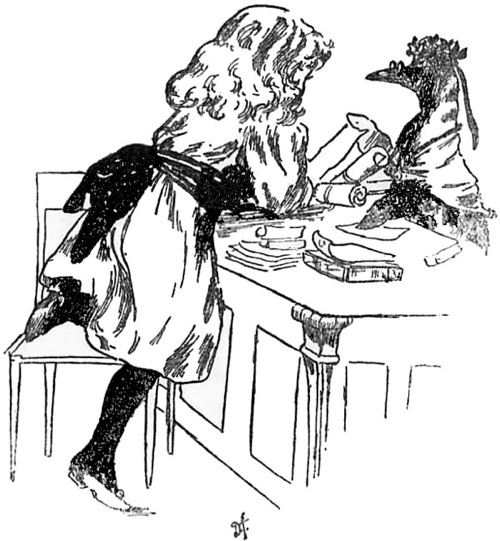
“‘THIS IS A VERY GOOD KIND,’ SHE SAID.”
The Wallypug said he would have the one marked 131fourpence halfpenny, and, after a struggle, drew his handkerchief out of his pocket with eighteenpence all in coppers tied up in one corner of it. Solemnly counting out fivepence, he waited for the change, and then carefully tying it up in his handkerchief, which he put back into his pocket, he handed Girlie the Excuse with a low bow, politely begging her to accept it as a little present.
Girlie thanked him and began to undo the package, which she found contained a sheet of foolscap paper with the following words beautifully written on it:—
“What a splendid excuse!” said the Wallypug, when Girlie had finished reading it aloud. “They can’t get over that, can they? You see, they can either believe it or not just as they like. Did you think of it all yourself, your Majesty?” he said, turning to Madame Penguin, who was looking greatly pleased at his praise of her Excuse.
133“Yes,” she said; “you see, I get quite a lot of new ideas from people who come in and out of the shop.”
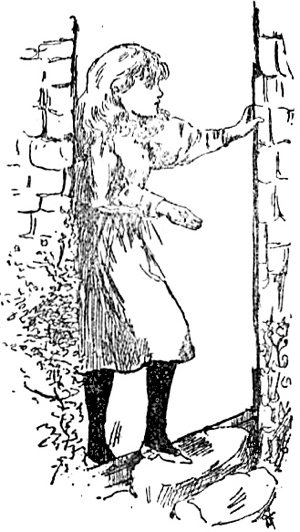
“SHE COULD SEE THAT THE SHOWER WAS OVER.”
“Well, I must say, your Majesty, that your Excuses are not like those of some people, who use the same ones over and over again. Now, I’m sure no one has heard that Excuse before.”
“Oh no,” said Madame Penguin, “I always make it a rule to have a different Excuse every time.”
134While they were talking, Girlie walked over to the door and looked out. She could see that the shower was over, and she came back and told the Wallypug so.
“Well, then, we must be going,” he said. “I’m sure we are very much obliged to your Majesty for allowing us to shelter here.”
“Oh, don’t mention it,” said Madame Penguin, coming to the door to see them off.
“Aren’t you coming to the excursion, too?” asked Girlie.
“No, dear,” said Madame Penguin. “I am going to stop at home and write an excuse for not going. Good-bye;” and, after shaking hands with them both, Madame Penguin hurried back into her little shop.
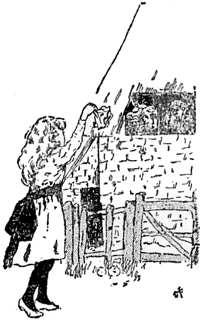
“IS it far to the Station?” asked Girlie, while they were walking along.
“Oh no, your Majesty, only just past the Crocodile’s lodge there,” replied the Wallypug, when they turned the corner.
“Oh, I know the Crocodile and I remember where we are, now,” said Girlie, when the Lodge came in sight. “I wonder whether that disagreeable Porter is still at the Station,” she thought; “and whatever shall I do, if he remembers about the ticket?”
However, she decided not to worry about it till it was necessary, and hurried along with the Wallypug till they 136reached the Lodge, at one of the upper windows of which Girlie could see the three Seals. They flapped their fins at her, and one of them called out, “We are coming, too, by-and-by.”
The great iron gates leading into the Station yard were wide open, and the courtyard was crowded with all kinds of animals, each carrying either a little basket or a bag, which, Girlie concluded, must contain their luncheon.
The Husher was bustling about amongst them, calling out “Silence! silence!” but no one was paying the slightest attention to him.
Inside the Station, the doors of which were closed, Girlie could see through the window the Porter excitedly arguing with a very fat Rhinoceros in a uniform, who, Girlie decided, was the Station-master. She could not hear what they were saying, but the Porter seemed to be very angry about something or other and was gesticulating violently.
It turned out afterwards that they were quarrelling as to the meaning of 10 a.m., which was the time fixed for the train to start; the Station-master arguing that a.m. stood for any morning, and the Porter declaring that it meant after meals. While waiting for them to 137decide, Girlie, who had lost sight of the Wallypug in the crowd, saw the Crocodile standing a little way in front of her, looking very sad indeed.
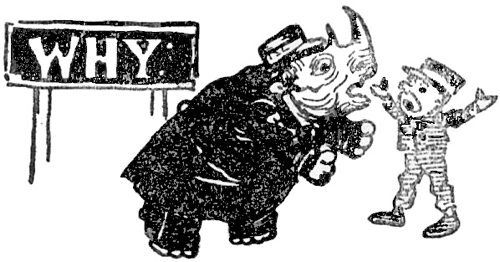
“THE PORTER SEEMED TO BE VERY ANGRY ABOUT SOMETHING.”
“I wonder what’s the matter with him,” she thought, trying to get nearer to him. “How do you do, Mr. Crocodile?” she called out, when she had got within speaking distance.
The Crocodile started and turned around nervously. “Oh! how do you do?” he said, when he saw her. “Stop a minute and I’ll come over to you”; and, pushing his way through the crowd, he was soon by Girlie’s side.
“How is your tea getting on?” she asked, after they had shaken hands.
138The Crocodile burst into tears. “Haven’t you heard?” he asked, sobbing.
“No,” said Girlie. “What’s the matter?”
The Crocodile shook his head sadly.” I had a dreadful accident with him on the day that I last saw you,” he said. “After I left you, I was wheeling him down the road, and had just got to the corner, when I stumbled against a stone and turned the perambulator right over.”
“Dear me!” exclaimed Girlie. “And what happened to your tea?”
“He was so upset, poor little thing! that he never got over it,” said the Crocodile, sobbing convulsively.
“Oh! don’t cry,” said Girlie. “It’s positively absurd to cry about a cup of tea, you know.”
“Is it?” said the Crocodile. “I’ve never thought about it in that light before; perhaps it is”; and he dried his eyes and began to smile. “Crocodiles,” he said, “are very easily moved to tears. Why, I remember a friend of mine, who lives in the River Nile, once telling me that just because a little black baby, whose mother left it alone on the bank near to where my friend lived, disappeared, he wept bitterly.”
“Where did the baby disappear to?” asked Girlie.
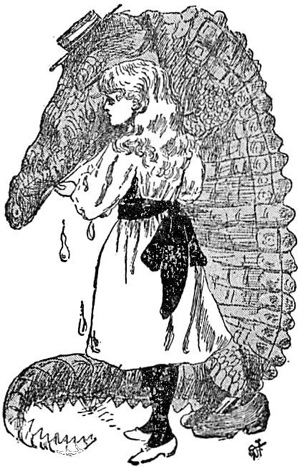
“‘OH! DON’T CRY,’ SAID GIRLIE.”
The Crocodile only winked and said in a curious way, “My friend said it was a most delicious baby,” which didn’t help Girlie to understand in the least what he meant.
While she was still puzzling about it, the Porter came to the door and began ringing a great hand-bell, and every one hurried into the Station and down the 140steps on to the platform, where a train was waiting for them.
A great scrambling took place to secure seats, and Girlie was just comfortably settling herself in the same carriage with the Wallypug (who beckoned to her from one of the windows), and a family of five Hippopotami, when the Porter came to the door and, after glaring at her for a moment in silence, walked rapidly away.
“He means mischief, your Majesty,” said the Wallypug; “I can tell it by his eye. Here he comes again,” he continued, as the Porter returned, followed by the Station-master.
“There!” he cried, pointing to Girlie scornfully, “that’s it. The Crow says it’s a Pig, and the Doctor-in-law says it’s a Noun without a Case, and I’m bothered if I can tell what it is. If it’s a Pig, it ought to go in the cattle-truck; and, if it’s the other thing, it ought to ride with the Alphabet.”
The Station-master scratched his head thoughtfully and looked much puzzled. “Let’s go and see whether there’s room in the Alphabet’s carriage for her,” he said after a pause; and they both walked off again.
“If you are going to ride with the Alphabet, your 141Majesty,” said the Wallypug hurriedly, when they had gone, “let me give you a little piece of advice. Sit perfectly still and don’t say a word and you will hear them talk. It’s most amusing, for, you see, they can only do or say such things as begin with the letter they represent. But you must be sure not to speak, or they will cease talking directly.”
Before he could say any more, the Porter returned, and, motioning Girlie to follow him, he showed her into another carriage, where she found the whole of the Alphabet sitting.
It was rather a squeeze to find a seat at all, but Girlie at last managed to settle herself in the corner against the window, and, as soon as she had done so, the Porter slammed the door to and, blowing his whistle, called out, “Right away”; and the train slowly steamed out of the Station.
Girlie determined to sit quite still, as the Wallypug had advised her, and, after a little while, this is what happened.
“She seems strangely silent,” said S, staring solemnly. “Supposing she’s stuffed!” she suggested stupidly.
“Ridiculous!” remarked R, rearranging railway rug.
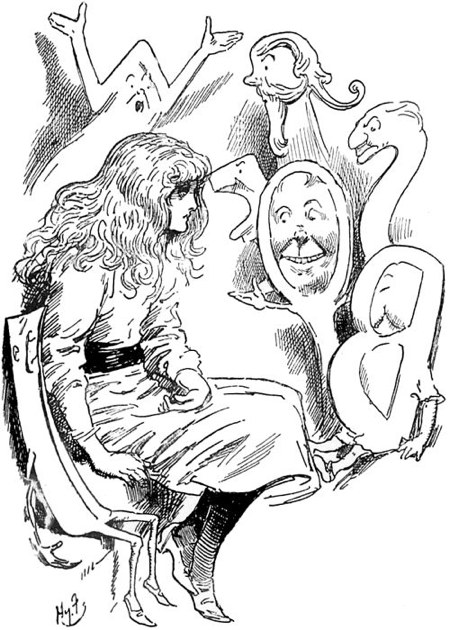
“IT WAS RATHER A SQUEEZE TO FIND A SEAT AT ALL.”
143“Probably pretending,” pouted P petulantly (petulant people perpetually pout).
“Well, well! we’ll wait, won’t we?” whispered W.
“Cautious creature!” cried C cheekily.
T tittered.
“Suppose someone sings something,” suggested S suddenly.
“Yes, you!” yelled Y.
“Bravo! bravo!” bawled B.
“Do, dear,” demanded D delightedly.
S smilingly started singing.
G groaned.
“Somebody seems sad,” said S sarcastically.
“What wonder!” whispered W.
“He hates hearing her howl,” hinted H, hastily hiding his head.
L laughed loudly,
While W winked warningly.
“Pray proceed,” pleaded P persuasively.
“Certainly,” cried C.
So S softly sang,—
“Chorus! chorus!” cried C.
144S smilingly started,—
“Isn’t it idiotic?” interrupted I.
“Very,” vowed V.
“Ridiculous rubbish!” remarked R rudely.
S stopped singing. She seemed sadly surprised. “Some said she should sing, some said she shouldn’t”; she said sorrowfully, “Should she?”
“Certainly; continue,” cried C, clapping clamorously.
“Encore! encore!” echoed E encouragingly.
A also applauded.
S seemed satisfied; so she smilingly started singing same song. Soon she sang slower, slower still; she stopped, sighing sleepily.
“Watch,” whispered W, winking wickedly.
S soon slept, snoring sonorously. Suddenly she started, shrieking shrilly.
H had hit her head hard, hurting her horribly.
F flew frantically forward, fearfully frightened.
“Good gracious!” groaned G, greatly grieved.
“Camphor! castor-oil! chloroform!” cried C confusedly.
E energetically employed eau-de-Cologne.
A afterwards advised arnica.
“What’s wanted?” wailed W. “Water?”
“An apology,” answered A angrily.
145“Immediately!” insisted I indignantly.
“Directly!” demanded D.
H hung his head. He “hoped he hadn’t hurt her.”
S softly said something soothing, smiling sweetly.
“Delightful disposition,” declared D.
“Absolutely angelic,” agreed A admiringly.
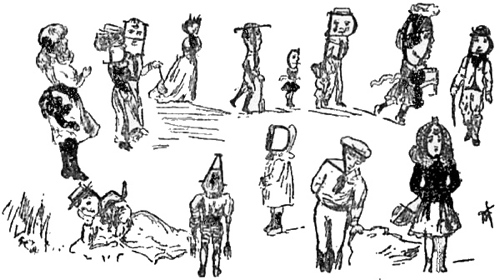
“MADE THE BEST OF THEIR WAY TO THE SEA.”
Presently P proposed playing picquet.
“Food first,” faltered F, feeling fearfully faint.
“Refreshments required!” roared R roughly.
“Ah! an admirable arrangement,” admitted A.
“Excellent,” echoed E enthusiastically.
S smilingly suggested something substantial; she said she should supply sandwiches.
“Ham,” H hoped.
N nodded.
146C considerately contributed currant cake.
B, blushing bashfully, brought Bath buns.
G generously gave greengages.
O offered oranges.
T told them to take two.
P presently produced preserved peaches,
While W wanted wine, which
V vigorously vetoed.
While this feast was still going on, the train, which had been simply flying along, suddenly stopped, and they all hurried out of the carriages and made the best of their way to the sea.
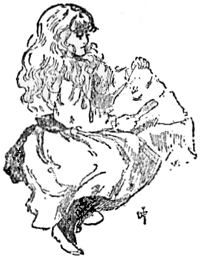
GIRLIE found the Wallypug sitting on a little heap of sand under the cliff, when she reached the shore, whither she had followed the others from the Station. He was stuffing some paper into his crown to make it fit more comfortably.
“I am just wondering, your Majesty,” he remarked when she came up to him, “whether it would be considered quite dignified of me to paddle.”
Girlie could not remember ever having heard of a king paddling before, and told him so.
“No, perhaps I’d better not,” he said regretfully; “we might build a sand castle, though, mightn’t we?” he suggested, after considering a minute.
148“Oh yes,” assented Girlie, clapping her hands, “that would be fun.”
So they set to work to build a large one. Girlie found a nice flat piece of wood to dig with, and the Wallypug had brought a little tin pail, which, he said, he always carried with him when he went to the seaside.
While they were digging the moat Girlie told him about the Alphabet and what had happened in the train.
“I quite liked that S,” she said, “she was so kind and forgiving.”
“Yes,” said the Wallypug, “almost everything that begins with S is kind; look at the Sea, for instance, see how kind and sympathetic that is.”
Girlie couldn’t quite see what he meant, so she asked him to explain.
“Well,” he said, carefully moulding some little sand towers for the top of the Castle, “I found it very sympathetic when I told my troubles to it.”
“Why, what did it do?” asked Girlie curiously.
“It sighed, your Majesty, the sea sighed,” he said; “wasn’t it kind of it?”
“Very,” laughed Girlie. “I wonder why the sea is so salt,” she asked presently; “do you know?”
“It’s the fish, I expect, your Majesty,” said the Wallypug.
149“The fish,” exclaimed Girlie; “why, what have they to do with it?”
“Well, most fish are salt, you know,” said the Wallypug; “haddocks, kippered herrings, codfish, anchovies and some kinds of sprats; they are all salt.”
“Oh yes, so they are,” said Girlie; “I wonder I never thought of that before.”
They were getting on nicely with the sand castle, and, presently, the Wallypug suggested that they should look for some shells to put around it. So they wandered down nearer to the sea and were looking about for the shells, when an Ancient Mariner came up to them and, pulling a lock of hair that hung down over his forehead, said in a gruff voice, “Fine day for a sail, gentlefolks.”
“Yes, it is,” replied Girlie.
“Would you like to go, your Majesty?” asked the Wallypug.
“Very much indeed,” said Girlie delightedly, for she was very fond of the water.
“How much do you charge?” asked the Wallypug of the Ancient Mariner.
“Sixpence a head,” said he.
“Very well, we’ll go, then,” said the Wallypug.
The Ancient Mariner touched his forelock again and 150muttered something about “going to fetch the horse and cart.”
“What does he mean?” asked Girlie.
“Oh! we always go to sea in a cart here,” said the Wallypug.
“Not in a boat?” asked Girlie in surprise.
“Oh dear no, your Majesty,” said the Wallypug, “they are so dangerous, you know, and are always getting capsized. Now, you’ve never heard of any one’s being shipwrecked in a cart, have you?” he went on.
“No,” said Girlie, “I never have, certainly, but it does seem a funny way to go to sea, doesn’t it?”
“Not at all,” said the Wallypug. “Haven’t you ever been to sea in a cart before?” he asked.
“No, that I haven’t,” said Girlie.
“How used you to get to your bathing-machines at Broadstairs?” asked the Wallypug.
“Well, we did go out to them in a cart when the tide was low, certainly,” said Girlie, wondering however the Wallypug knew that she had been to Broadstairs.
“Very well, then, you have been to sea in a cart,” said the Wallypug; “I thought you had.”
“But not right out,” argued Girlie.
“It’s all the same, your Majesty,” remarked the 151Wallypug; and at this moment the Ancient Mariner returned leading a very lean horse harnessed to a clumsy-looking waggon with low seats running along each side of it, and with steps at the back, like a bathing-machine.
“All aboard, please,” he sang out, climbing up into his seat and cracking his whip.
Girlie and the Wallypug scrambled up the steps, and the Ancient Mariner held out his hand for the fare, which he said he must have before starting.
The Wallypug paid him from his little store in the handkerchief, and they were just driving into the sea, when they heard a voice calling from the shore,—
“Hi! hi! stop, ship ahoy, there!” and, turning round, they beheld a very stout woman with a baby in her arms running towards them, and Girlie noticed, to her great dismay, that it was the Porter’s wife.
“The Bathing-machine Woman,” said the Ancient Mariner. “All right, Mum, we’ll wait for you; don’t flurry yourself,” he called out.
The Bathing-machine Woman continued to run and at last reached them. Climbing breathlessly up the steps, she threw herself down on the seat, panting heavily.
152“Where do you want to go to, Mum?” asked the Ancient Mariner.
“Home,” panted the Bathing-machine Woman, pointing to a bathing-machine a long way out.
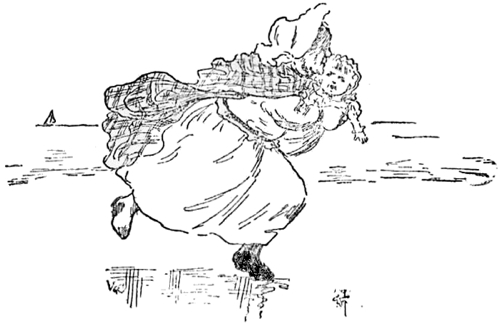
“‘HI! HI! STOP, SHIP AHOY, THERE!’”
“That will be sixpence,” said the Ancient Mariner. “Babies in arms not charged for.”
“I’ve only got fourpence halfpenny,” said the Bathing-machine Woman.
“Well, I can’t take you for that, you know,” said the Ancient Mariner.
“Oh, I’ll pay the difference,” said the Wallypug 153kindly, taking the last of his little store of coppers out of his handkerchief.
The Bathing-machine Woman thanked him, and the Ancient Mariner, after pocketing the money, cracked his whip again and off they started into the water.
For some time the water only came half-way up the wheels; but, after a time, when they got a little distance from the shore, the cart began to float and the horse to swim, and they rose up and down on the waves.
Girlie did not feel in the least alarmed and quite enjoyed it; the sun glittered on the water and they floated merrily onward. Presently she began to be aware that the Bathing-machine Woman was staring at her very curiously.
“I seem to know your face, somehow,” she said at last, frowning thoughtfully.
“Do you?” said Girlie, who did not feel at all inclined to tell her where they had met.
“Yes, yours is such a pretty face, you know, my dear, that one cannot easily forget it,” said the Bathing-machine Woman, rocking her baby to and fro.
“Oh, come, that’s much better,” thought Girlie. “Why, she seems to be quite amiable;” and she wondered what was coming next.
154No one spoke, however, for some time, and, at last, the Wallypug proposed that somebody should sing a song.
“Oh, yes, that would be lovely,” said Girlie. “Won’t you please sing something, Ma’am,” she said to the Bathing-machine Woman.
“Oh, I used to sing once, dear,” she replied, looking pleased at having been asked, “but I’ve no voice now; he’ll sing, if you ask him, though,” she continued, nodding her head towards the Ancient Mariner, and then going up to him and giving him a poke with her finger. “The young lady wants you to sing,” she shouted.
“I sing only one song and that you know,” he said, turning round.
“Well, won’t you sing it now, please?” pleaded Girlie.
“Well, I will if you wish, Miss,” said the Ancient Mariner. “It was written specially for me by a gentleman who came out in my horse and cart one day.” And, taking his pipe from his mouth, he began singing in a gruff voice the following song:—
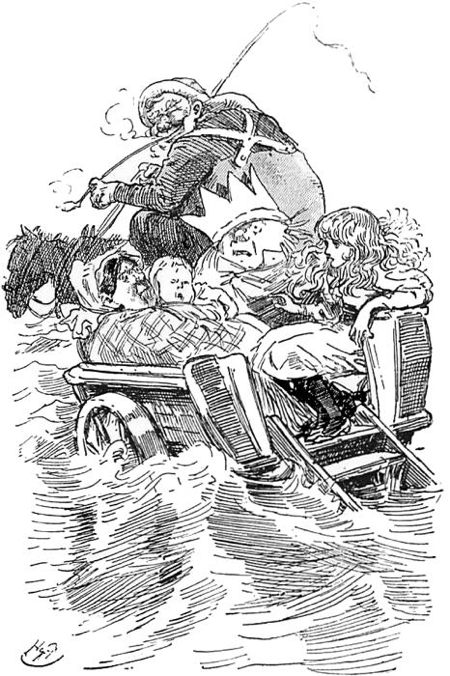
“‘I SEEM TO KNOW YOUR FACE, SOMEHOW.’”
They all clapped their hands when he had finished, and Girlie laughingly said, “she hoped that he was not the Mariner referred to in the song.”
“Oh, yes, I am, Miss,” he admitted, “but I sha’n’t ask any of you for sixpence more, d’ye see, for I know that you haven’t got it;” which was perfectly true, for Girlie had none and the Wallypug had given the last of his little store of coppers to make up the Bathing-machine Woman’s sixpence.
“Oh dear! I’m afraid there’s going to be a squall, your Majesties,” said the Wallypug suddenly, looking with alarm at the Bathing-machine Woman’s baby, 157which was screwing up its face in a very ominous manner.
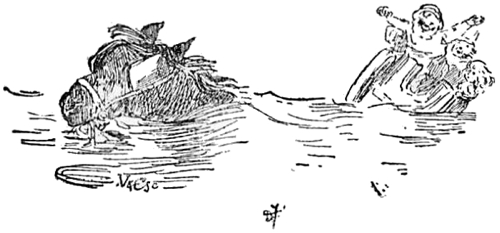
“BROKE LOOSE AND SWAM AWAY.”
“Bless me, yes, so there is!” said the Ancient Mariner, becoming greatly excited, jumping up on the seat and shouting out a lot of orders in a loud voice. “Now then, belay there, hoist the main jib, hard-a-port, three sheets in the wind, shiver my timbers and blow me tight!” (I am grieved at having to record these terrible expressions, but I am sorry to say that sailors are not at all particular in their language when they get excited.)
The baby began to cry, the sea grew rougher and rougher every minute, and the cart tossed about in a most alarming manner.
Girlie was rather frightened. “Do you think there is 158any danger?” she asked of the Wallypug, who was nervously clinging to the side of the cart.
“You are requested not to speak to the man at the wheel,” roared the Ancient Mariner, and, just then, the horse, which had been plunging about violently, broke loose and swam away, leaving the cart to float by itself.
The Bathing-machine Woman screamed and the baby squalled louder than ever.
“Oh dear! oh dear! whatever shall we do now?” cried poor Girlie, while the Wallypug still clung to the side of the cart, looking very pale indeed.
“Land ahoy, on the starboard side,” called out the Ancient Mariner presently, when an island came in sight to the right of them.
“There, now we are going to be cartwrecked, I suppose,” cried Girlie, as they drifted towards it (for she thought that this must be the proper word to use under the circumstances). She was greatly relieved, however, to find that the cart, when they neared the island, rose quietly on a large wave, which lifted them gently on to the sand and then receded, leaving them high and dry on the shore.
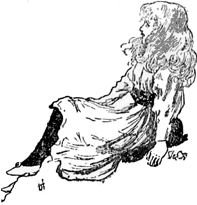
THEY all scrambled down from the cart and looked at each other in dismay.
“Whatever shall we do now?” said the Ancient Mariner. “I’ve never had such a thing happen to me before.”
“Explore the island,” said Girlie promptly. “People always do that the first thing when they get cast on a desolate island.” You see she had read so many of her brothers’ books about shipwrecks and adventures of that kind that she knew exactly what to do. “Then we must build a hut,” she went on (thinking of Robinson Crusoe), “and stop here till some passing ship sees our signals of distress and rescues us. 160Oh! it will be lovely!” and Girlie danced about delightedly. The others did not seem to be half so pleased about it as she did, and the Wallypug remarked dejectedly that he “didn’t see what they should do for food.”
“Oh! you and the Ancient Mariner will have to go out shooting game and things, and catch fishes and turtles,” said Girlie, “and we will stop at home and cook them and keep the house tidy; that’s the way people do in books.”
“But we haven’t any guns to shoot with,” objected the Ancient Mariner.
This was rather puzzling, and Girlie had to think some time before replying; at last, however, she said decidedly, “Oh, I know; of course there will be a chest washed ashore presently, with all kinds of tools and guns in it, and another one with ship’s biscuits and tinned meats; that is what always happens in the story books. I expect we shall find them here when we’ve done exploring the island. Come along.” And Girlie led the way through the bushes and trees, which grew so close together that they had some difficulty in getting along, especially the Bathing-machine Woman, who, as you will remember, was rather stout. At last, however, they came to an opening 161and could see a sandy desert stretching before them apparently for miles, for they could only just catch a faint glimpse of the sea sparkling in the sunlight on the further side of the island.
“Well, this is a rum-looking place to come to,” said the Ancient Mariner as he viewed the scene.
“H’m! there don’t seem to be many shops about,” said the Bathing-machine Woman, “and I hate a place without shops, it’s so dull. I don’t think I shall stop here,” she said (though she didn’t say how she was going to get away).
“I wonder what that thing over there is?” said Girlie, shading her eyes and looking at what seemed to be a very curiously-shaped rock about half a mile away.
“Let’s go and see, your Majesty,” suggested the Wallypug.
This seemed to be the only thing to do, so they all set out through the sand, which was most uncomfortable for walking in. On drawing nearer to it, they could see that the curiously-shaped rock was really a Sphinx carved out of stone. To Girlie’s great surprise, the Crow, to whom she had lent her pocket-handkerchief, was perched up beside it reading a newspaper, stuck up in front of him.
162“Well, I never, if it isn’t the Pig,” he said, turning his head and staring at her through his spectacles, “and the Wallypug, I do declare. Why, I’ve just been reading about you both in The Daily Whyer; look here,” and he held out the paper for them to see.
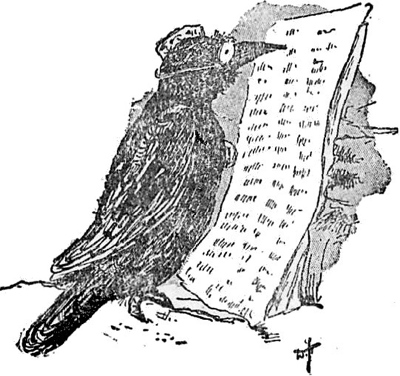
“PERCHED UP BESIDE IT READING A NEWSPAPER.”
Girlie took it from him and read in large letters, “Mysterious disappearance of the Wallypug and the Human Noun, last seen making mud pies on the sea shore.”
“We weren’t!” cried Girlie indignantly. “It was a sand castle we were building.”
163“Well, it’s a very interesting account, anyhow,” replied the Crow; “and you can’t expect newspaper accounts always to be quite correct, you know, can you? I was just reading it aloud to the Sphinx.”
“What was the use of that?” asked Girlie; “it can’t hear you.”
“Oh! can’t it, though,” said the Crow; “that’s all you know about it. It can hear better than you can, I’ll be bound; can’t you, old chap?” he said, speaking to the Sphinx.
The Sphinx did not reply, of course, but it seemed to Girlie that it smiled in a very knowing way.
“It doesn’t say much but it thinks a good deal, I can tell you,” the Crow went on. “It hasn’t lived all these four thousand years for nothing.”
“Good gracious! is it so old as that?” cried Girlie, while the others stared at it in amazement, the Bathing-machine Woman exclaiming with surprise,—
“Law! bless me, who’d have thought it, now?”
“Has it lived here all that time?” asked the Ancient Mariner after a pause.
“Yes,” replied the Crow, “of course; what a stupid question.”
“I don’t believe it, then,” said the Ancient Mariner defiantly. “What has it lived on?”
164“Sandwiches,” replied the Crow; “it’s the only thing you can get here.”
“Sandwiches!” exclaimed Girlie, looking about; “why whatever do they make them of?”
“Sand, of course,” said the Crow contemptuously. “Any donkey knows that; that’s why they are called sandwiches.”
“O’ugh! how horrid!” said Girlie. “I should think they must be very nasty.”
“I’ve had occasion before to remark that you are very peculiar in your tastes,” said the Crow sarcastically. “They’ve been having a rare lark at Why since you’ve been away,” he continued, addressing himself to the Wallypug.
“What have they been doing, your Majesty?” asked the Wallypug anxiously.
“Well, you’re supposed to be dead, to begin with,” replied the Crow, “and the Cockatoo has headed a Revolution, and has got herself proclaimed Protectress, and oh! there’s rare goings on, I can tell you.”
“Oh dear! oh dear! I do wish I could get back. I know what that old Cockatoo is,” said the poor Wallypug anxiously; “she will upset everything and everybody. Can’t you suggest something, your Majesty?” he cried, 165turning to Girlie; but Girlie did not know what to advise.
While they had been talking, the Bathing-machine Woman and the Ancient Mariner had gone a little way off on an exploring expedition on their own account (the Bathing-machine Woman having first made a comfortable bed with her shawl for the baby, between the feet of the Sphinx, where it lay sleeping peacefully, with its little thumb stuck in its mouth). Girlie could see them in the distance, and presently the Ancient Mariner shouted and beckoned to them excitedly.
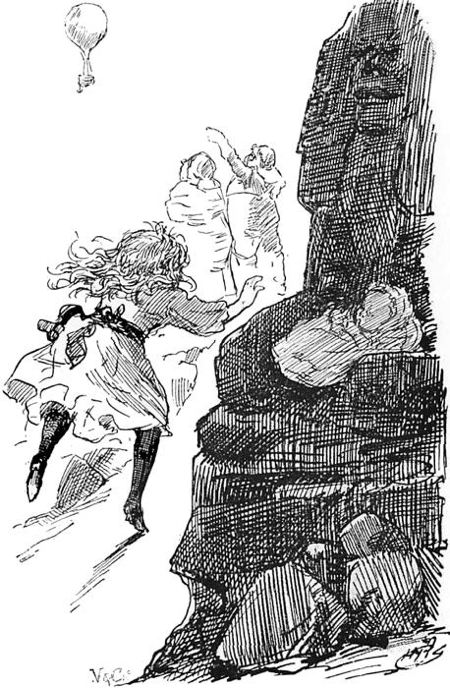
“‘WHAT’S THAT?’ HE ASKED, POINTING IN THE AIR.”
“What’s that?” he asked, pointing in the air when they hurried up to him.
They could just discern a little black speck ever and ever so far away.
“I suppose it couldn’t be a plum pudding, could it, your Majesty?” suggested the Wallypug meekly.
“Nonsense,” cried Girlie, “whoever heard of a plum pudding sailing about in the air. No! it’s a balloon,” she decided, after looking at it for some time.
“And so it was. They watched it grow larger and larger as it drifted towards them, and, at last, they could just distinguish some one in the car.
The Crow said he would fly up and see who it was, 167and presently returned, saying, “It’s all right, it’s the Royal Microscopist come to look for you; I told him that you were here, and he is coming down at once to pick you up.”
The Bathing-machine Woman screamed and said she “was sure she could never go up in one of those nasty, horrid things;” but Girlie thought that she should rather like it.
Meanwhile the balloon was descending rapidly, and they could soon distinguish the Royal Microscopist looking over the side of the car.
“Here you are, then,” he called out cheerfully; “how are you all?”
“Very well indeed, thank you,” shouted Girlie, who was very glad to see him.
They had some difficulty in securing the balloon, but, at last, they succeeded in catching the anchor under a great rock partly buried in the sand, and the Royal Microscopist quickly threw out a rope ladder and descended to the ground.
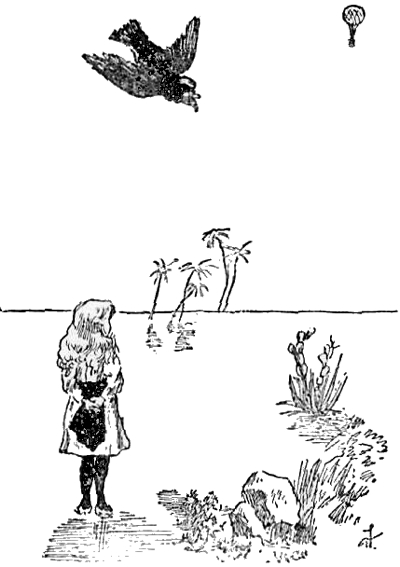
“THE CROW SAID HE WOULD FLY UP AND SEE WHO IT WAS.”
After kindly shaking hands with everybody, he turned to the Wallypug and said, “Things are really reaching such a pitch at Why, that I couldn’t stand it any longer, so set out to try to find you. Everything is completely topsyturvy. The Cockatoo, who has had herself proclaimed 168Protectress, has established herself in the Royal Palace, and has turned out your two sisters, who have had to go to the Crocodile’s to lodge. She has made the Doctor-in-law Chancellor of the Exchequer with full powers to make what taxes he likes, so long as he gives her half, so he simply taxes us for everything. It costs three half-pence to sneeze at Why now, a halfpenny to sit down and 169a penny to stand up, fourpence halfpenny a day to talk out loud, and twopence three farthings to whisper, and I’m really afraid that we shall have to pay for breathing, next. The Husher has been imprisoned for calling the Cockatoo names, and all the King’s Minstrel’s compositions have been publicly burned, and he has been fined forty-six pounds seven shillings and ninepence three farthings ‘for writing rubbish’; so that, altogether, things are in a very uncomfortable state.”
“I can’t think,” said Girlie, who had been listening in great surprise, “how all this could have possibly happened in so short a time; why, it was only this morning that we started for the Excursion.”
“Oh, you know how queerly time goes at Why,” replied the Royal Microscopist. “We’ve had a whole month there since you’ve been away.”
“What’s the date there now, your Majesty?” asked the Wallypug.”
“The onety-twoth of Octobruary, I think; isn’t it, Crow?” said the Royal Microscopist.
“My paper is dated the twoty-threeth of Januember,” replied the Crow, “but, since weekly papers never do come out on the day that they are dated, you are as likely to be right as I am.”
170“Well, anyhow, we’d better get back as quickly as possible, your Majesties, hadn’t we?” asked the poor Wallypug.
“I suppose you are all coming back?” said the Royal Microscopist, looking around at the little group inquiringly.
“The Bathing-machine Woman and the Ancient Mariner don’t belong to Why,” explained the Wallypug, “but we can drop them out on our way.”
The Bathing-machine Woman screamed again and the Ancient Mariner looked greatly alarmed, too, till the Wallypug assured them that he did not mean to drop them out of the balloon, but only to set them down at their own homes when they reached them.
So the Bathing-machine Woman went to fetch her baby, which was still lying between the feet of the Sphinx. She came running back a minute or two afterwards, screaming violently.
“Take the child,” she cried breathlessly, bundling it into the Royal Microscopist’s arms, and immediately falling back against the Wallypug in a fainting fit.
“Good gracious! whatever is the matter with her?” said he, struggling under her weight, while the Ancient Mariner ran to his assistance.
171“She’s fainted, I expect,” said the Wallypug, panting. “I wonder what we’d better do.”
Somebody suggested putting a key down her back.
“I don’t think that would do any good,” said the Royal Microscopist. “Give her some of this;” and he took a small flask of sherry and water from his pocket.
They poured a little between her lips, and she soon opened her eyes.
“What’s the matter?” asked the Royal Microscopist. “What frightened you?”
“It’s that old Sphinx,” said the Bathing-machine Woman, faintly; “it winked at me.”
“What!” they all cried in surprise.
“It winked at me,” persisted the Bathing-machine Woman. “I had just fetched my baby and turned round in my funny little way to say ‘Good-bye, Sphinxy dear,’ when I saw the horrid old thing wink. I’m sure it did, for I wasn’t quite certain about it at first, but, when I looked the second time, it winked its other eye. Oh dear, oh dear! I was never so frightened in all my life before; I do believe the thing is alive.”
This all sounded very mysterious, so, as soon as the Bathing-machine Woman had sufficiently recovered, they walked over to the Sphinx and had a good look at it.
172It sat quite still, however, staring straight in front of it with that very knowing expression on its face that Girlie had noticed before.
“It must have been her imagination, I expect,” said the Royal Microscopist, while the Crow chuckled as though he knew more about it than he cared to say.
“Well now, let’s be off, your Majesties,” said the Wallypug, who was in a hurry to start; but there arose a serious difficulty to their doing so, for, when they had all scrambled into the car of the balloon, it would not rise with all their weight in it.
“Why don’t you go back by sea?” inquired the Crow of the Ancient Mariner and the Bathing-machine Woman.
“I only wish we could,” replied the Ancient Mariner; “only we have lost our horse.”
“Why, he swam ashore soon after you all landed; I saw him,” said the Crow. “I daresay he is somewhere over by the cart now.”
They decided that the best thing to do would be to hunt for him, and so they all got out of the balloon and went over to where they had left the cart. They soon found the old horse quietly grazing on the grass under the trees. He seemed quite pleased to see his master again and neighed delightedly when they fastened him into the shafts.
173The sea had become quite calm once more, and Girlie almost wished that she was going back with them in the cart, which they watched floating away on the water, the Bathing-machine Woman waving her handkerchief till they were out of sight. The Royal Microscopist, the Wallypug and Girlie then hurried back to the balloon and, climbing up into the car, they succeeded in getting the anchor loose, and were soon rising rapidly up into the air, the Crow perching in the ropes over their heads.
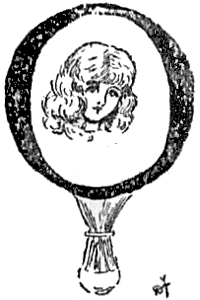
“OH! this is lovely!” cried Girlie, as the Balloon rose higher and higher, till the island with the solitary Sphinx on it looked a mere speck in the sea below them. “Will it take us long to get home?” she asked, after they had been floating along for some time.
“Oh no, not long,” replied the Royal Microscopist. “What shall we do to pass away the time?”
“I know a little love story about a pig that I can repeat, if you wish,” suggested Girlie. “It’s called ‘Piggie’s Courtship.’”
The Wallypug and the Royal Microscopist both said that they should very much like to hear it, and the Crow laughed and said, “Oh, if it’s about 175a Pig, I daresay you will repeat it very nicely.”
“What do you mean?” asked Girlie.
“Why, ‘birds of a feather flock together,’ and the same remark applies to pigs, I suppose,” he said, chuckling to himself.
Girlie wisely did not take the slightest notice of this rude remark, but stood up and tried to curtsey, as she had been taught to do before beginning a recitation; curtseying in a balloon, though, while it is going up, is a most difficult thing to do, and poor Girlie did not succeed very well in her attempt, for she first stumbled forward into the Wallypug’s arms and then, trying to recover her balance, she fell back and sat plump into the Royal Microscopist’s lap.
They all had a good laugh at her misfortunes, and then Girlie smilingly said that she thought that, under the circumstances, perhaps, she had better sit down to recite, and the others agreeing with her, she sat with one hand holding the side of the car and the other one resting in her lap while she repeated the following story which, as she explained, a young friend had recited at their last School Entertainment just before the Holidays:—
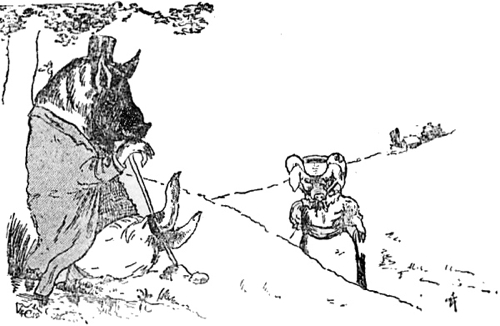
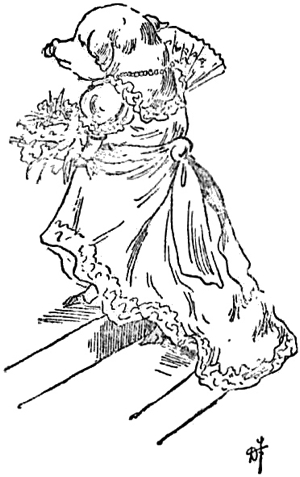
The Wallypug and the Royal Microscopist both clapped their hands when Girlie had finished, but the Crow said in a scornful voice,—
“That’s a very old-fashioned kind of love story; they don’t write them like that at all, nowadays. This is how a modern love story goes”—and he took off his spectacles and held them in one claw while reciting the following verses:—


“A MODERN LOVE STORY.
“The Lady Betsy Mary Jayne Was very tall and somewhat plain. (Indeed, does anybody doubt it?) Sir Robert Richard Peter Prim Was also tall and rather slim (Well, please don’t make a fuss about it).
“They met each other quite by chance While touring in the South of France. (Pray, why repeat such idle chatter?) She said she really wouldn’t wed; It drove the poor man off his head! (Oh! did it? Well, it doesn’t matter.)
“They met again, ’twas at a ball, And so got married after all. (Don’t bother! No one cares a jot!) She turned out cross and rather ‘snappy,’ So even now they are not happy! (Oh, aren’t they? Who cares if they’re not?)”
181“Well, I’m sure I like the way mine ends much the best,” said Girlie, when he had finished.
“Hear, hear!” said the Royal Microscopist, “so do I, my dear. I like the old-fashioned stories best, too; those that end with a smile and leave you feeling all the better and happier for having read them, and not all this new-fangled rubbish that ends up with a sneer and makes you feel miserable. What do you say, Wallypug?”
“Oh,” said the Wallypug, who seemed to be anxious to please everybody, “I thought them both very pretty. But isn’t that Why that I can see over there?” he said, pointing down to where the tops of some large buildings were just visible amongst the trees a long way below them.
“I believe it is,” said the Royal Microscopist, turning a tap and letting some gas escape so that the balloon began to descend rapidly.
They could soon see that the Wallypug was right, for presently, they recognised the Royal Palace and the Public Hall.
“Ah! I shall be very glad to get back again,” said the Wallypug wistfully. “I am beginning to get very anxious about my people. How very quiet everything seems,” he went on as they floated over the town. And indeed the streets seemed to be quite deserted, and there was no one 182at all in sight, not even in the Market Place in front of the Public Hall.
“I hope nothing serious has happened,” thought Girlie; for this mysterious silence frightened her, and she was very glad when the balloon slowly settled down in the gardens of the Royal Palace and they all got out.
The Wallypug walked quickly towards the Palace, looking very serious, and the others followed him in silence. On nearing the building they could hear voices raised in angry dispute, and, hurrying to the Dining Hall, whence the sounds proceeded, they threw the door open and beheld an extraordinary sight.
The room was in the utmost confusion, the remains of a feast occupying one end of the long table, while the rest of it was piled high with little bags of silver and gold. The Doctor-in-law and the Cockatoo sat at the table, the Doctor-in-law with a very red face and the Cockatoo looking very angry; they had evidently been quarrelling violently. They both looked up in surprise when they heard the door open, and the Cockatoo screamed as the Wallypug, followed by Girlie and the Royal Microscopist, entered.
“What does all this mean?” said the Wallypug in a stern voice and with a quiet dignity which seemed to come to him all at once.
183The Cockatoo shrank back into her chair and the Doctor-in-law hung his head and seemed to be stricken dumb.
“Where are all my people?” demanded the Wallypug in a firm voice. “Answer me!”
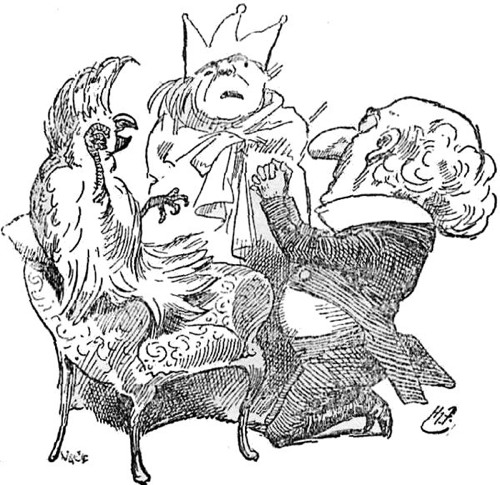
“‘OH, PRAY FORGIVE US,’ CRIED THE DOCTOR-IN-LAW THROWING HIMSELF ON HIS KNEES.”
“In bed!” said the Doctor-in-law faintly.
“In bed!” cried the Wallypug. “What do you mean?”
“Oh! pray forgive us!” cried the Doctor-in-law, throwing 184himself on his knees, while the Cockatoo hid her face in one claw and rocked herself to and fro, saying over and over again, “What shall we do? What shall we do?”
“Get up at once!” said the Wallypug, “and tell me what you mean. Why are the People in bed?”
“Because of the Taxes,” groaned the Doctor-in-law.
“What do you mean? Explain yourself!” demanded the Wallypug.
“We taxed them one and ninepence three farthings a day for getting up!” faltered the Doctor-in-law, “and, now that the other taxes are so heavy, nobody has any money left, and so they are obliged to stop in bed.”
The Wallypug looked very angry. “Where is the Town Crier?” he asked at length.
“In prison,” answered the Doctor-in-law, turning pale.
“What for, pray?” cried the Wallypug.
“Taxes,” moaned the Doctor-in-law.
The Wallypug frowned and, walking over to the other side of the room, pulled the bell rope violently.
The Cockatoo began to sob and the Doctor-in-law threw himself down on his knees again.
“The Servants have all gone away,” he said tremblingly.
“Gone away! Where to?” cried the Wallypug in surprise.
185“Prison,” said the Doctor-in-law, beginning to sob.
“Do you mean to tell me,” said the Wallypug indignantly, “that they have gone to prison for taxes, too?”
“Yes,” faltered the Doctor-in-law. “You may as well know, at once, that everybody, except the Cockatoo and myself, is either in prison or in bed because no one has any more money left to pay taxes with.”
The Wallypug stamped his foot impatiently. “Go and bring the Town Crier to me at once,” he said.
And the Doctor-in-law got up from his knees and hurried out of the room.
“Shall I go, too?” asked the Cockatoo meekly.
“Stop where you are!” shouted the Wallypug. “Well, this is a pretty state of affairs,” he continued, addressing himself to Girlie and the Royal Microscopist. “I wonder what would have happened, if we had not returned when we did. Oh! here comes the Town Crier!” he exclaimed a few minutes later, when the Doctor-in-law and he entered the room both panting heavily and looking as though they had been running very quickly.
“Go at once and proclaim that I have returned, that all the taxes are abolished, that there will be a meeting in the Public Hall at five o’clock, and that all the People of Why are expected to attend it,” said the Wallypug.
186The Town Crier bowed respectfully. “Certainly, sir,” he said, “And I should like to say, sir, that I am very glad to see you back. We have been getting on very badly without you.”
“Thank you,” said the Wallypug quietly. “Now go and issue the Proclamation. As for you two,” he cried, turning to the Doctor-in-law and the Cockatoo, who were trembling violently, “you shall be locked up in separate rooms till the Public Meeting is over and I know what is to be done to you.”
After locking them up, the Wallypug sent for a list of all the people who had been imprisoned for not paying their taxes. Girlie was greatly surprised to see that the King’s Minstrel’s name appeared amongst the rest.
“Why, he told me that he was enormously rich!” she said to the Royal Microscopist, when the Wallypug had gone out of the room to sign the pardons.
“Nonsense! he was always as poor as a church mouse!” declared the Royal Microscopist. “He would tell you anything, if he thought that you would believe it. His statements, my dear, are like walnuts; they are improved very greatly by being taken with a grain of salt.”
“Then he isn’t engaged to the Wallypug’s niece, either, I suppose?” said Girlie.
187“Why, the Wallypug never had a niece, my dear, so I don’t see how that could be!” laughed the Royal Microscopist. “He only says things of that sort to try to appear grand, but I should think that his pride has had a fall this time, anyhow!”
And it turned out afterwards that the King’s Minstrel had really been so much upset at the overthrow of all his grand boastings that as soon as he was released he had left the country in disgust, missed by a very few and regretted by none.
After they had enjoyed some refreshments (which the Royal Servants prepared for them as soon as they had been liberated from prison) it was time for them to go to the Public Meeting, and, when the Wallypug, followed by Girlie and the Royal Microscopist, entered the Hall by the door near the throne, the entire company rose to their feet and cheered over and over again.
The Wallypug looked highly pleased at this reception, and bowed repeatedly and then, motioning Girlie to a seat which had been placed for her on the dais beside him, he ascended the throne amidst more cheering.
When the confusion had somewhat subsided and the people had resumed their seats, Girlie could see that all of her old friends were present, including the Fish (who 188seemed somewhat better) the Calf, the Seals, and the Crocodile. Madame Penguin smiled pleasantly at her from her old seat near the door, and even the Porter and the Station-master were there.
They had a prolonged meeting, and it was eventually decided that the Wallypug was to be for ever excused from addressing his subjects as “Your Majesty,” and that he was to have entire control of his own property and personal affairs, while the people were still to make their own laws and govern themselves. The money which had been wrongfully collected for taxes was all to be restored, and the Doctor-in-law and the Cockatoo were to be punished by not being allowed to attend any of the Public Meetings in future, nor to have any voice whatever in the affairs of the Nation.
Before the meeting was over, the Husher formally asked the Wallypug for his permission to propose to one of his sisters, and caused some little amusement by not being able to remember which one it was that he was in love with. He at last decided, however, that it must be Belinda. The Wallypug willingly gave his consent, and the meeting then dispersed, and Girlie followed the Wallypug into the Palace again, the Royal Microscopist and the Husher being invited to join them.
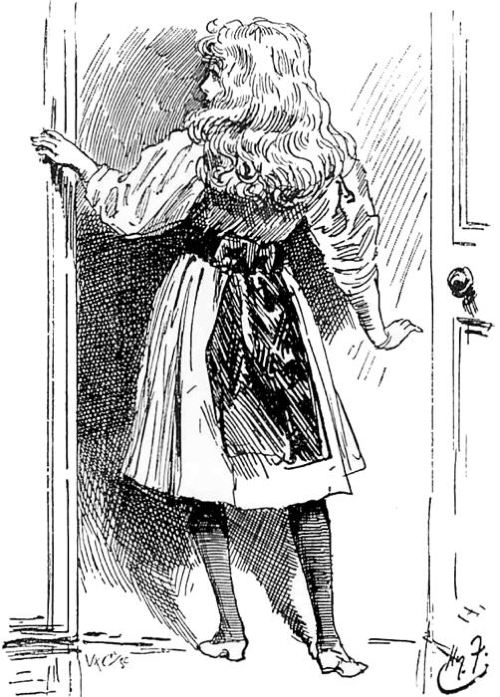
“PUSHING IT OPEN, SHE WALKED THROUGH.”
190They found Belinda and Lucinda waiting for them in the Amber Drawing-room, they having returned from the Crocodile’s, where they had been lodging. They seemed greatly pleased to see the Wallypug again, and were most gracious to Girlie, calling her “dear” and making quite a fuss of her.
The Royal Microscopist seemed to be very particular in his attentions to Lucinda, and Girlie thought that she should not be at all surprised if they made a match of it, too. At Belinda’s request, she followed the sisters upstairs, when they went to dress for dinner, and, while they were walking along the corridor, Lucinda pointed out to her a door with the words “Girlie’s Room,” written over it.
Pushing it open, she walked through, when the door immediately closed again and Girlie found herself, to her great surprise—where do you think? I am sure you will never guess.
Why, in her own little play-room at home. The door by which she had entered had entirely disappeared and Ellen was just entering by the usual door with the teatray.
191“Why, Miss Girlie,” she said when she came in, “how quiet you have been all the afternoon. You must have been fast asleep.”
“I’m sure I haven’t!” cried Girlie indignantly, rubbing her eyes, though, and staring about her rather confusedly. “I’ve been having the most lovely adventure!”
To be sure Dumpsey Deazil was still lying on the domino box and, on looking more closely at Boy’s letter, which Girlie found herself holding in her hand, she saw that the word she had taken to be “Goo” was really “Good,” the d being on the next page, Boy not being at all particular as to how he divided his words; the whole sentence read—“I have found a good many shells.”
Still, Girlie was only half convinced, for were not the fishes in her little Aquarium all apparently saying O-o-o-b, o-o-o-b, just as the Fish with a cold had done, and, outside in the park, could she not see several Crows stalking about under the trees looking as though they might be searching for the Goo which they hoped would turn out to be a large worm?
“Had she been asleep or not?” that was the question; 192she couldn’t decide at all, but, after a little while, she went up to Ellen, who was arranging the tea-table, and said,—
“Ellen, I’m very sorry that I contradicted you so rudely just now, for—for perhaps I may have been to sleep after all, you know.”